Andrielle Seinrill
"Areeott has no gods, no kings, no queens. But if you walk the land long enough, you’ll start to wonder if there isn’t someone you’re supposed to remember. Someone just beyond the edges of history."
In a land that lives by what it never says aloud and dies by all that it does, Andrielle Seinrill’s name lives only in the shadows cast by a man cursed to outlive her memory. Her love for Areeott was as unrelenting as the land was unforgiving. She was the pulse beneath the shattered calm of a country consumed by the global chaos of The Shattering and a kingdom fractured by the machinations of a King lost to heresy and madness. Her name may be veiled in shadow, but her absence is a silence too sharp to name. Her legacy still commands the soul of the realm.
Yet history remembers her imperfectly, filtered through seven centuries of grief, reverence, and silent yearning. Her life, tragically cut short, became the fulcrum upon which Areeott’s fate turned. Once vibrant and fiercely independent, Andrielle's legacy endures not just in Corvyn’s mournful devotion but in every silent promise, every forgotten vow, and every hidden tear shed beneath Areeott's serene facade.
Born as a daughter of the noble Lockhart family in far off Louve, Andrielle was raised with an expectation to be seen yet often felt invisible next to her striking sister Cynthia. She was a thinker, a quiet intellectual who found comfort in books and the simpler joys of life even while navigating the complex political web of her aristocratic upbringing. Though she struggled with her own self worth, Andrielle was always deeply empathetic. Her understanding of pain and joy alike would serve her well in the roles she would come to play in the story of Areeott. But her internal struggles were never a sign of weakness. Rather, they forged her into someone who would fight for others to be seen and for herself to be understood.
Andrielle believed in people long after the world gave her every reason not to. She fought savagely for her family, for her home, and for the fragile beautiful idea that dignity and kindness could heal the wounds of a broken nation and that even in those uncertain times something precious would endure. Despite her own unimaginable loss, when Areeott decended into civil war, her voice was the rallying cry for a people and a steadfast promise. Andrielle held together a land broken by ruin, divine silence, and the coldest of betrayals.
Her fierce love and loyalty to those who offered aid to her and her homeland in its most desperate times shaped a promise to the lost, the hunted, and the forgotten. She turned smugglers into scouts, orphans into couriers, artisans into architects of survival. She gave her allies structure and through that purpose. But most important of all, she gave people hope when the flames of war had taken everything else from them.
Andrielle's leadership was forged not from lineage but from unwavering resolve. To those watching she appeared almost delicate, a scholar misplaced among weapons, but Andrielle commanded with a mind as sharp as the blades she directed and a heart fierce enough to hold the shattered pieces of a nation together. She led not as a conqueror but as a guardian, blending strategy with compassion, forging alliances from suspicion and hope from despair, standing as the defiant light in the darkness of war and death.
And when she was torn from him, her husband forever bound by power, memory, and pain built a perfect prison of stone and law, a kingdom sculpted not for freedom but for remembrance without hope, devoted to the memory of a woman whose loss would echo through eternity. There are nights when travelers claim the constellations above The Agriss Mountains rearrange themselves. They swear a new star lingers just long enough to show a safer turn down a narrow trail. Scholars dismiss the tale but the shepherds of Areeott continue lighting small torches whenever the sky feels restless.
Beneath the surface of Areeott lies a current of unfinished mourning and it flows back to her. To the woman who held the line in a war that should have broken her, to the girl who grew up in a house of mirrors and learned how to see through illusion, who crossed the world to chase the stars and built something real when it mattered most. She loved the land not because it was kind but because it was hers. She loved Corvyn with the kind of faith that outlasts kingdoms.
No statue honors her. No songs sing her name. Yet every scar borne by Areeott’s land carries the ghost of her devotion. Andrielle’s legacy survives not in monuments or song but in every law bent toward mercy and the quiet acts of grace that ripple through the fabric of Areeott. To understand her is to walk through fire and find mercy in ash. To feel a love that transcended loss and a spirit that endures beneath the silence of a kingdom perfected yet profoundly broken.
The Girl Beneath the Stars
“There are stars that don’t belong to constellations. They pass through, burn silent, and leave the sky lonelier than before.”
Throughout her childhood in the distant country of Louve, Andrielle Lockhart sought answers in places others overlooked, in the stars above her balcony, in the pages of forgotten books, and in the quiet shadows cast by her older sister Cynthia’s brilliance. She was small, quiet, and often unnoticed, a delicate figure moving softly through grand halls that echoed with laughter and gossip but rarely with her own voice. Though born into aristocracy, Andrielle felt distant from the extravagant trappings of wealth and status. Her mother draped her in silks and satins, adorned her hair in intricate coils, and paraded her before crowds of finely dressed strangers. Yet beneath the finery, Andrielle ached for authenticity, craving a life defined not by obligation but by genuine connection and intellectual freedom.
On quiet nights, Andrielle would slip out onto her balcony, chin resting upon her hands, eyes reflecting the distant shimmer of the constellations. Those stars became her silent companions, each twinkle a gentle reassurance that there existed a world beyond the polished surfaces and masked intentions of polite society. Her family's manor in Louve, a stately home filled with beautiful objects and carefully managed impressions, felt to her like a cage, grand, gilded, yet unbearably confining. Amidst lavish balls and tedious court gatherings, Andrielle would quietly fade to the fringes, her presence muted by the radiant charm of her older sister Cynthia. Andrielle never resented Cynthia, their bond was deep and genuine, built on mutual trust and affection. Yet beneath that sisterly love, Andrielle carried a quiet ache, a longing to be recognized, to have someone see beyond the shadow she inhabited and perceive clearly the young woman she desperately wished to become.
She found solace in the family library, a sanctuary filled with old tomes and hidden knowledge, and there her restless intellect first blossomed. Her tutors soon discovered that behind her timid demeanor lay a voracious mind. Astronomy quickly became her favorite subject, and before long she was quietly sneaking into her great uncle Alvin's observatory, an ivy covered tower that stood secluded on the estate grounds. There, surrounded by instruments of celestial discovery, she would stay awake long past bedtime, charting stars and dreaming of distant worlds where a girl like her might shine as brightly as any sun. Knowledge became her refuge, a fortress she carefully constructed around herself, offering her the quiet strength she yearned for.
Yet even as Andrielle flourished intellectually, her mother's exasperation grew. Andrielle tore her gowns climbing trees or walking barefoot through gardens at dawn, the seamstresses shaking their heads at her stubborn measurements and unconventional manners. She cared little for lace and jewels, her deepest joys came in moments of quiet rebellion, feeding horses in the stable, wandering alone through fields, or eavesdropping on her father’s political discussions not out of idle curiosity but to understand the hidden currents of power and manipulation. These quiet acts done in the shadows made her stronger and more perceptive, yet they deepened her sense of isolation from the carefully constructed world around her.
As adolescence gave way to early womanhood, Andrielle began to sense more profoundly the widening distance between herself and the life she was expected to lead. Her father, seeking to reclaim his political relevance, announced a grand astronomical event at their manor. Distinguished astronomers and foreign dignitaries from across the known world would gather for a month long observation of a rare celestial convergence, an event promising spectacle and political opportunity. Andrielle greeted the news with mild interest, it was simply another gathering of pomp and expectation. She did not realize, as she quietly counted down the days, that among the many guests journeying toward Louve was an envoy from a distant northern land, a young noble from Areeott named Corvyn Seinrill, whose arrival would soon alter the course of her life entirely.
Midnights In the Garden
"Every soul is born with a thread tied to distant stars, yet no two threads follow the same path. What we choose to become defines how we weave our fate into the greater tapestry.”
Her life changed on an evening gilded with starlight and possibility. The welcoming ball her father hosted for their distinguished guests was something Andrielle had planned to avoid entirely, only Cynthia's gentle insistence finally coaxed her to attend. Wrapped in midnight blue silk, feeling more costume than herself, she stood quietly at the fringes of the marble floored ballroom as guests from far off lands mingled gracefully with Louve’s nobles. Musicians played an exotic waltz, the notes unfamiliar yet haunting, drifting through the grand room. Andrielle remained aloof, still carrying the subtle ache of isolation, feeling herself entirely separate from the merriment.
Yet across the sea of elegantly dressed dancers and dignitaries, she glimpsed a figure standing apart, as detached as she was. The young man was tall, his features sharply defined, striking yet distant. His attire marked him clearly as foreign, with a deep charcoal coat trimmed subtly in Silver, bearing the crest of a rising phoenix. His black hair brushed his shoulders, framing a face made compelling by eyes of an unusual shade, dark blue with subtle hints of violet that caught the lamplight as though lit from within. There was an intensity to him, a presence that seemed out of place among the superficial grandeur. Andrielle’s gaze lingered longer than she intended and before she could look away their eyes met, the contact electric and unexpectedly intimate.
Where she expected polite indifference, his gaze instead conveyed recognition as though he too had glimpsed something rare and unexpected. Across the crowded hall, he inclined his head in a courteous gesture, an unmistakable invitation for introduction. Andrielle’s heartbeat quickened, surprise mingling with a faint thrill she thought long extinguished. Cynthia noticed immediately, gently nudging her and together they crossed the marble floor toward the stranger.
His introduction was both formal and understated. Corvyn Seinrill, son of Baron Augustus Seinrill of Venlin, a distant canton nestled among The Agriss Mountains in Areeott. His voice carried the faintest accent of the northern mountains, deep and resonant, adding weight to his quiet words. Corvyn’s bearing revealed hints of his heritage as a newly knighted member of Xal'Kanan's Astaray Knights, sworn to duty amidst the escalating conflict with the Dragon Insurrection and the growing shadow of The Risen Scourge. Up close, however, Andrielle sensed something in him that contradicted the stern discipline implied by his military honors. There was a softness behind his measured speech, a quiet unease at the expectations that weighed upon him. Beneath the martial poise lay an artist’s heart, a philosopher’s mind, hidden from view yet unmistakably present in the careful way he chose his words and the gentle manner he observed the world around him.
As Cynthia smoothly exchanged polite formalities, Andrielle noted how Corvyn’s attention never wavered from her own face, his subtle quiet fascination somehow more meaningful than flattery or charm. When he asked polite questions about the event’s astronomical observations, clearly expecting perfunctory conversation, she found herself answering not with trivial pleasantries but with sincere enthusiasm, quietly confessing her role aligning the telescope and studying her great uncle Alvin’s astronomical notes. Corvyn’s genuine delight startled her, his respectful acknowledgment of her intellect rather than her noble status drawing out feelings she had long buried.
They met again quite by accident in the observatory gardens beneath a quiet moon. Both had slipped away from the closing speeches to savor solitude, neither expected company. He leaned casually against the railing, his long black hair tied loosely back, a small journal resting at his side. Without pretense or formality, Corvyn asked her thoughts about an unusual aberration in the western sky. She softly laughed, quietly telling him it was only a cloud and that patience would soon see it move. His answering laugh felt effortless, warm, and genuine. Soon their conversations drifted naturally from stars and science to philosophy, art, and dreams of distant lands, revealing in Corvyn a vulnerability he rarely displayed. Despite his family’s leadership of military intelligence for The Western Church Kingdoms, he quietly confessed to hating the secrets that filled his life, the burden of silent knowledge, the painful necessity of hidden truths. In the observatory gardens, in quiet whispers beneath stars that kept their secrets without judgment, Corvyn found a rare place where he could lower his guard.
From there, their meetings became frequent yet subtle. Beneath the starlit sky, they debated star charts and constellations, their conversations quietly transforming from polite intellectual exchange to spirited debates filled with gentle teasing and understated affection. He never sought to impress or overwhelm her, yet every quiet encounter became more compelling. Corvyn revealed more of himself with each meeting, showing Andrielle a depth of sensitivity and artistic reflection she had scarcely imagined possible from someone so deeply involved in military affairs. With Corvyn, Andrielle felt genuinely seen, not as Cynthia’s sister or as a pawn in a political arrangement but as herself entirely, mind and heart. Andrielle, in turn, saw Corvyn not as a knight or noble heir but as a thoughtful dreamer quietly burdened by responsibilities he had not chosen, a gentle soul whose true nature stood quietly at odds with the martial expectations placed upon him. Their mutual understanding blossomed naturally, inevitably, with each secret conversation, each gentle disagreement, each moment they spent beneath the quiet stars.
Yet their quietly growing bond soon faced a harsh test. Andrielle discovered that her father, driven by debts and political desperation, had already promised her hand to another, a cruelly arrogant young nobleman from Louve. Her quiet despair was overwhelming, yet she said nothing, inwardly resigned to fulfill familial obligations. Corvyn, however, would not allow the quiet resignation she wore so painfully. In an act of startling defiance before the gathered nobility, Corvyn publicly challenged the suitor, defeating him decisively and coldly, offering only quiet contempt toward the arranged union. Dropping silver ingots at her father’s feet to absolve any lingering debts, Corvyn took Andrielle’s hand and alongside Simon, her sister's orphaned son whom she dearly loved, stepped through a magical portal to his distant homeland.
The portal closed behind them quietly, leaving behind Louve and the life she had always known. Ahead lay Areeott, mountains and uncertainty. Yet she felt no regret as she gripped Corvyn’s hand tightly, stepping forward into a new life that promised genuine freedom, acceptance, and a love unlike anything she had quietly dreamed beneath her distant beloved stars.
A Home Among the Mountains
“In the heart of Areeott, time weaves not with threads but with the breath of those who’ve walked its land, eternal and enduring.”
Areeott greeted Andrielle with towering peaks and open arms, a land whose raw beauty stood in stark contrast to Louve’s soft vineyards and carefully cultivated estates. As Corvyn’s entourage wound slowly along mountain roads toward Seinrill Castle, Andrielle gazed out at vast valleys draped in evergreen and distant waterfalls that gleamed like threads of spun silver. The Agriss Mountains soared upward, imposing yet majestic, crowned by snow that sparkled in the late winter sun. Each turn in the winding path brought vistas of a world ancient and untamed, yet to Andrielle’s surprise, deeply inviting. Through Corvyn’s letters and stories, this rugged land had quietly become a second home in her imagination and as she drew closer that sense of homecoming grew into something quietly profound.
Seinrill Castle itself stood proud and imposing, its ancient walls and spires set against a stark dramatic sky. It was a fortress built as much by necessity as by pride, a testament to the Arin people’s resilience amid centuries of conflict and vigilance against dragons and darker threats from the Azar Empire. Yet within its halls, Andrielle discovered not only strength but warmth. She carried with her a subtle grace that mirrored Corvyn’s own character. In her first quiet weeks there, she began gently weaving herself into the fabric of her new home, learning to move in rhythm with Arin life, guided by genuine curiosity rather than obligation.
The people of Venlin watched her at first with polite reserve, quietly curious about the foreign noblewoman who had captured Corvyn’s heart. But as she embraced their traditions, she spent time learning their cooking, tending gardens alongside Elizabeth the castle gardener’s wife, and openly delighting in simple pleasures and they quickly warmed to her. Soon Andrielle found herself not only welcomed but beloved, her genuine interest and quiet kindness winning hearts effortlessly. Her newfound role suited her perfectly, offering her the authenticity she had always craved, allowing her at last to shed the polite masks and carefully crafted images of Louve.
Motherhood soon deepened her bonds to Areeott, first with the arrival of Daemon her cherished firstborn, followed later by twins Anson and Cassandra. Parenthood came naturally, filling Andrielle’s heart with quiet joy and fierce protectiveness. Yet this happiness was never blind, she was acutely aware of the delicate balance required to maintain peace in such a volatile land. She watched Corvyn with both love and subtle worry, recognizing the pressures he bore as a leader in a growing conflict, his responsibilities quietly weighing upon him even in moments of domestic intimacy.
In the private spaces of their home, Andrielle saw clearly how Corvyn struggled quietly with the demands of duty. Despite his outward strength and discipline, she recognized beneath his carefully maintained poise a gentle soul uneasy with secrets, a philosopher burdened by strategies, an artist compelled by circumstances to wield sword rather than brush. She became his sanctuary, gently encouraging him to lower his guard, to speak of dreams and doubts rather than tactics and diplomacy. At night, by quiet hearth fires or beneath starry skies, she softly reminded him of his own quiet truth, that beneath the noble titles and military commands he had always been an artist, a thinker, a man who hated secrets despite the quiet necessity of keeping them.
Their love, deepened by trust and quiet understanding, became the quiet strength anchoring them amid uncertainty. Andrielle’s faith in Corvyn’s gentler nature held him steady, quietly pulling him back when he risked drifting too far into darkness. For his part, Corvyn’s devotion provided Andrielle the validation and affection she had sought since childhood, nurturing in her an inner confidence that had long been suppressed.
Yet the world outside their private sanctuary grew increasingly perilous. Areeott faced escalating threats from dragons and their Draconic cultists, and political tension simmered quietly beneath the surface of everyday life. Corvyn, ever burdened by the family’s role leading military intelligence efforts across The Western Church Kingdoms, moved carefully amid shadowy plots and uncertain alliances. Andrielle quietly witnessed the toll taken by the relentless responsibilities, seeing how heavily the hidden truths weighed upon him, each secret another stone quietly laid upon his shoulders.
Even as they built their family, filling their home with warmth and laughter, Andrielle carried an unspoken awareness of the delicate nature of their peace. Yet within her heart was an unwavering resolve, a determination to fiercely protect the quiet happiness she had discovered. When tensions began to flare dangerously close to home and rumors of open conflict spread, Andrielle and Corvyn prepared the catacombs beneath Castle Seinrill as a shelter, a precaution they prayed would remain unused. Neither imagined how swiftly their carefully constructed sanctuary would soon become a necessity, nor how profoundly it would test their quiet strength, their shared faith, and the bonds that held them gently but firmly together.
A Shattered World
"The treachery of Isari's kin,
Met fiery end for grievous sin.
In ashes now their legacy lies,
Beneath the vengeful mother’s cries.
Andrielle never imagined herself a figure of war, nor could she have foreseen the storm that would sweep away the quiet happiness she had so carefully built. The Dragon Insurrection, simmering quietly at first, erupted into chaos and Areeott found itself thrust into the jaws of a conflict that had brewed for generations. With each new day, alarming messages and hastily sealed letters arrived warning of attacks, betrayals, and the looming shadow of The Risen Scourge. Castle Seinrill, a place that had come to represent tranquility and quiet strength, quickly became a haven for anxious whispers and tense strategy meetings behind closed doors.
Corvyn carried the greatest burden. Duty had long compelled him to keep painful secrets and make impossible decisions, but never before had the weight of leadership pressed so mercilessly upon him. Andrielle watched him retreat quietly behind a stoic facade, a noble figure of command in the daylight yet haunted and restless by night. As conflict spread across the region, Corvyn and his allies determined they must journey to Bastion, a distant fortress where the fate of the kingdom might be decided. Reluctantly, Corvyn left Andrielle behind in Castle Seinrill, assuring her of their safety, confident in the carefully reinforced catacombs that lay beneath their ancestral home. Those catacombs had been quietly prepared in case of emergency, a haven for the entire family carefully secured by ancient magic, reinforced by careful preparation and quiet vigilance.
Yet fate had crueler plans. In Corvyn's absence, betrayal crept silently through Areeott’s halls. House Isari, outwardly loyal, secretly plotted to eliminate the Seinrill lineage, manipulating the chaos of war to advance their ambition. Their lies promised safe passage from the kingdom, coaxing The Seinrill Family away from their ancestral home and into a trap. Andrielle, pregnant once again though unaware she carried twins, quietly refused to abandon Castle Seinrill, insisting that at least one Seinrill remain to safeguard their heritage. She, along with Simon, Elizabeth, Martin, Ena Spar the trusted housekeeper, and a loyal Cleric, withdrew into the carefully sealed catacombs, unaware of the horror unfolding elsewhere.
Beneath the castle’s stone walls, in the dim light of lanterns, they waited anxiously. Above ground, Areeott descended into anarchy. The Shattering, a catastrophic event that twisted the very fabric of magic and reality, ruptured wards and ancient enchantments, leaving their sanctuary broken, sealed in, and dangerously vulnerable. Trapped underground, they existed on quiet hope and cautious planning, forced to confront grim possibilities while praying for rescue.
It came in an unexpected form. Tieflings, outcasts who had suffered prejudice and mistrust, risking everything to rescue the trapped Seinrills. Together with dwarves, changelings, shifters, and elves who rallied in defiance of fear, they quietly and courageously breached the damaged wards and broke through stone and rubble. Emerging into the daylight, Andrielle learned the staggering truth of the family’s betrayal, that Daemon her beloved firstborn had been cruelly slain along with nearly the entire Seinrill lineage. A quiet fury ignited within her, grief crystallizing into resolve. She gathered the survivors around her and made a solemn vow to the Tieflings and all who had aided her. So long as Areeott endured, they would have a home, a sanctuary, a place of honor.
That vow echoed quietly through history, shaping Areeott’s future more profoundly than she could have imagined. Yet at that moment, Andrielle was driven solely by grief and determination, channeling emotions she never knew she possessed into strategic brilliance and calculated vengeance. With careful precision, she took command of the scattered loyalists, quickly emerging as the quiet yet indomitable heart of the resistance. Soon, however, that carefully contained fury spilled over, manifesting in an act of stark retribution against House Isari. On the grounds of their ancestral castle, she activated a powerful artifact that unleashed primal fire, consuming the traitors and their supporters in a blaze of devastating justice. Her vengeance was total, decisive, terrifying, and haunted her deeply afterward. Only at Granna Voss' gentle insistence did she finally relent, the old Tiefling’s steady voice quietly reaching through her rage, coaxing her back toward restraint and reason.
When Corvyn finally returned after his harrowing journey home, she saw in his eyes the agony of what he had endured and he saw in hers the quiet depth of the woman she had become in his absence. Corvyn was shattered by loss, consumed by guilt and a need for vengeance. The reunion was bittersweet, each quietly acknowledging how profoundly circumstances had changed them. Amidst victories and setbacks, they tried to rebuild a quiet intimacy, yet the strain of conflict and grief created fractures beneath the surface. She recognized with quiet sorrow that the man she had loved, the philosopher and artist beneath the noble facade, had been profoundly wounded by events he could neither prevent nor reconcile.
Even as their forces gradually rallied, aided quietly by hidden bargains Corvyn reluctantly made, Andrielle sensed the growing emotional distance between them. Though their love endured and quiet tenderness persisted, an unspoken chasm had emerged, one made deeper by the quiet presence of Oriana Proudfeather, whose own growing feelings for Corvyn had become gently obvious. Andrielle wrote privately of her heartbreak, quietly confiding in her diary the painful realization, I am losing him and he is losing himself.
Yet they stood firm, quietly leading their allies through desperate battles toward a fragile hope for victory. At the height of this struggle, the Second Siege of Seinrill Castle brought the conflict to its inevitable climax, forcing Andrielle and Corvyn to confront not only external foes but also the quiet tensions that had lingered unresolved between them. It was a siege whose outcome would shape the destiny of Areeott forever, a moment when hope and loss would collide irrevocably and from which nothing, neither quiet strength nor enduring love, could emerge unchanged.
The Treachery of Angels
"The ones who leave us early are the ones we needed forever."
The final siege of Castle Seinrill unfolded under a night sky so dark it seemed to swallow even the stars themselves. Below that oppressive darkness, the stone walls trembled under the relentless assault, each thundering impact of siege engines resonating like the tolling of doom. The grand corridors, once warmed by laughter and quiet domesticity, were now alive with the chaos of hurried footsteps, shouted commands, and quiet prayers whispered into shadows. It was as though the castle itself had become a beating heart, fierce yet fragile, its pulse quickening with each blow, each distant cry of battle. Andrielle stood resolutely at its center, her quiet authority radiating outward, calm and steady amidst the turmoil.
Outside, the enemy pressed forward with brutal determination, driven by desperation as much as hatred, their forces led by the Heretic King Amraz himself, a figure whose very presence chilled the marrow of those who glimpsed him. Each wave of assault came fiercer, each struggle more desperate, and yet Andrielle faced it all with steadfast bravery, directing defenders with measured calm and a presence of mind that belied the chaos around her. She had grown accustomed to leading, to making swift difficult choices under pressure, yet each decision quietly bore the weight of a thousand lives, every command resonating through halls filled with loyal soldiers who trusted her absolutely.
In quieter moments between attacks, she stole glances at Corvyn, who stood grim faced and tense beside her. She knew that beneath his outward resolve, he grappled inwardly with choices he had made and secrets he bore, sacrifices quietly rendered that even she had not fully grasped. As the enemy closed in, Corvyn had increasingly withdrawn into himself, weighed down by the quiet burdens of dark bargains struck in desperate necessity. Andrielle recognized the subtle shift and saw plainly how deeply these quiet shadows tormented him. She wanted more than anything to reach him, to bridge the quiet invisible gap that had opened between them, yet the siege left little room for quiet conversations or whispered reassurances.
Close by, Oriana Proudfeather fought bravely, each strike of her spear swift, sure, driven by loyalty and quiet determination. Yet Andrielle perceived something hidden in Oriana's glances toward Corvyn, those quiet looks laden with longing, pain, and resignation. Andrielle felt no bitterness, only quiet sorrow, understanding how the bonds of war and shared suffering could forge feelings that neither planned nor intended. She knew Oriana’s heart, knew its quiet turmoil, and she wished she could have spoken openly, offered quiet compassion, acknowledged the depth of feelings that bound them all in complicated ties of loyalty and love.
As the siege escalated, the defenders began to falter, pushed back toward the inner sanctum. Amraz's forces breached the outer gates, their shouts of triumph echoing brutally in the air. Each step backward felt like defeat, yet Andrielle rallied her forces once again, her quiet voice firm and unwavering. She drew courage from memories of gentle days with Daemon in sunlit gardens, quiet evenings with Corvyn beneath the stars, the laughter of Simon, Anson, and Cassandra echoing down stone hallways. These were the quiet treasures she fought to preserve, the moments of quiet happiness that had defined her, that justified every sacrifice, every carefully measured risk.
Yet fate moved with cruel precision, gathering threads carefully woven through time into a single brutal knot. The final confrontation unfolded in the castle’s Blue Tower, beneath shattered stained glass windows whose jagged edges framed the chaos outside. Corvyn stood fiercely against King Amraz, their blades clashing violently, each strike laden with years of hatred, betrayal, and bitter loss. Around them, loyalists fought desperately, struggling to hold their ground. Amidst this chaos, Andrielle held her place, guiding defenders, her mind sharp with tactical brilliance, her heart quietly heavy with dread.
Then, in a single horrifying instant, everything changed.
Corvyn had struck the final blow, King Amraz lay dead at his feet, and for a heartbeat the world held still. Corvyn stood barely upright, breath shallow, his blade lowered, too exhausted to lift it again. The fight was over. The roar of battle faded into eerie quiet, the clamor outside the tower muffled by the shattered walls. Andrielle saw him, bloodied but alive, victorious against all odds. Relief surged through her like light breaking through storm clouds. She moved without thinking, her arms outstretched, running to him, tears in her eyes and a breathless laugh breaking free at last. She never saw what came for him.
Oriana had not landed a strike in the duel. She had not moved during Amraz's death. She had held the Master’s Edge tightly in hand, her face tense, unreadable. In antiquity, Xal’Kanan had sent that dreaded weapon to the mortal world and into the hands of his Astaray Knights to combat the threat of the Prime Dragons, and had ordered Oriana to strike down whomever emerged victorious in the final confrontation between King Amraz and Corvyn. This fall was preordained. The god had known Oriana’s loyalty was wavering, and had felt her heart shifting in quiet defiance. So he did what he always did when his instruments failed him. He seized her.
Andrielle saw nothing of this. She did not see Oriana rise silently into the air, her wings flaring outward with divine fire. She did not see the moment her friend lost control of her own body, nor the horror in Oriana’s eyes as the god she served hijacked her limbs. Oriana’s dive was swift, precise, silent. The sword was aimed directly at Corvyn’s exposed back. He did not hear it. He did not see it. Neither of them did.
Andrielle reached him at that exact moment, slipping between them with the momentum of joy, not sacrifice. Her arms closed around him just as the blade struck. It pierced clean through her, driving forward until its tip glanced Corvyn’s ribs, halted only by the last ounce of resistance left in her fading strength. She gasped, stunned, not even comprehending what had happened at first. Her eyes widened, then dimmed. She looked up into Corvyn’s face, confusion flashing through her expression, and then the pain came.
Oriana hit the ground screaming, her wings vanishing mid collapse as she skidded across the stone, clawing at the floor, sobbing in helpless rage. She had not meant to. She had tried to resist. But it had not been her hand. It had not been her will. The sword clattered from her fingers and slid away, its divine glow guttering like a snuffed flame.
Corvyn stared down, frozen, his arms catching Andrielle as she slumped into him. The blood on his chest was not his own, not at first. His voice broke, then shattered completely, as the full horror of what had happened began to unfold.
Andrielle fought desperately for breath, vision dimming. The quiet sanctuary of Corvyn’s embrace was strangely comforting even as life ebbed. Her beloved Corvyn, he was alive, he was safe, the twins were safe and that meant Areeott was safe. In that knowledge, at least, there was peace.
Her heart ached fiercely, in knowing him, knowing how he could be and what her absence would do to him, how it would break him. She wanted to leave him with something, some small reminder of the love she had for him, anything for Corvyn to hold on to for as long as they would be parted, a piece of herself which would always remind him of those simple happy times before fate had destroyed everything for which they, their friends and their country had fought and suffered.
With fading strength, she lifted a trembling hand to Corvyn’s face, twisted in utter despair, her fingers tracing his cheek gently, reassuringly. She saw the grief etched deeply into his expression, his torment stark, unbearable. Her gaze lifted toward the shattered windows, to the night sky now opened wide and filled with stars.
In that final moment, Andrielle recalled quiet nights of childhood spent beneath Louve's constellations, gentle evenings holding her sweet nephew Simon’s tiny hand, and those of her own children Daemon, Cassandra, and Anson, whispered dreams beneath starlight with Corvyn. She tried to offer him one last quiet reminder of the man he truly was beneath duty and obligation, a final echo of the gentle philosopher and artist she had loved so deeply. With the last of her strength, her voice barely audible, she whispered softly, Look at the stars. Her lips curved faintly in a gentle quiet smile of reassurance and peace.
She exhaled a final shuddering breath, life slipping quietly away as the world fell utterly still around her. Corvyn’s scream tore through the tower, raw and haunting, a sound of pure unendurable pain. Time seemed to fracture, splintering reality into quiet echoes of grief. Those around them fell silently to their knees, overwhelmed by the enormity of loss. Andrielle’s passing rippled through the gathered survivors, an absence so profound that even victory itself became meaningless.
King Amraz lay defeated, his forces broken, yet triumph meant nothing. Andrielle Seinrill, the heart of their resistance, their quiet strength, their guiding star, had fallen. With her death came silence, deep, profound, and unbearable.
Corvyn finally collapsed from the wound that Oriana’s strike had opened in his own chest after passing through Andrielle’s tiny frame. His own life was fading but when the darkness came for him, the Corvyn the world once knew was already dead. They fell together, Corvyn still holding her lifeless form. It was only through the quick thinking of Aelissa Akkara that saved Corvyn from bleeding to death and becoming another victim of the Master’s Edge.
The first to return to her senses, she screamed and leapt upon the fallen couple, desperately hoping for some sign of life between the two of them. With a glance she could tell Andrielle was beyond saving. Aelissa bit her lip and promised to mourn her friend another time. Corvyn was dying. He was bleeding to death before her eyes. She was able to stabilize his body and heal his physical wounds but part of her would forever wonder if perhaps she should have let him die there with her.
She had saved her friend’s life but in her heart, she knew that Corvyn was gone forever.
Mental characteristics
Accomplishments & Achievements
“True greatness is not in what is built, but in what endures after you can no longer protect it.”
Among the fractured histories that struggle to capture the full weight of the Shattering and the collapse of old orders, Andrielle Seinrill’s legacy emerges not as a monument to power but as a living current beneath the foundations of modern Areeott. Her greatest accomplishments were not forged in singular acts of heroism but in the quiet endurance of her ideals. She never wore the mantle of ruler in any formal sense, yet it was her resolve that steadied the survivors of the Seinrill bloodline through betrayal, siege, and destruction of reality itself. Her death ended an era, but her life preserved everything that came after.
Though raised among Louvine nobility and shaped in the cold shadow of her sister Cynthia’s brilliance, Andrielle carved her achievements along paths no other Lockhart dared to walk. She escaped the confines of court through study, slipping into her great uncle Alvin’s observatory and mastering celestial alignments and scholarly calculations without fanfare or recognition. By the time of the grand astronomical convergence that brought Corvyn Seinrill to Louve, she had already memorized volumes of forgotten texts and mapped constellations into hand-drawn star charts still preserved in castle archives. Her intellect was not performative, it was practical, applied with precision and humility. It was through that intellect that she earned Corvyn’s respect not by heritage, but by insight.
In Areeott, her contributions shifted from academic to existential. When she arrived at Castle Seinrill following Corvyn’s defiance of Louvine politics, she found herself not a nobleman's wife, but a cultural outsider. Rather than withdraw, she immersed herself fully in the lives of the people. She spent a great deal of time learning their customs, tending to gardens, working beside the castle staff, and integrating herself not as a lady of title but as a member of the community. The people of Venlin did not take her in because of her name. They embraced her because she embraced them first. Within months, she was beloved by those who had once viewed her with suspicion.
It was during the aftermath of House Isari’s betrayal that her endurance transformed into leadership. Trapped within the catacombs beneath Castle Seinrill, pregnant with twins and surrounded by a few desperate refugees from the decimated household, she provided a stabilizing force that went far beyond emotional resilience. Though the enchantments that once protected the family stronghold had fractured, and escape was uncertain, it was Andrielle who kept fear from overwhelming those around her. She did not rally them with speeches or displays of nobility. She remained present, steady, and compassionate. Her survival was not just a physical act, but rather one of a defiant rejection of despair.
Upon their eventual rescue by an unlikely coalition of Tieflings, changelings, dwarves, elves, and shifters, Andrielle recognized the cultural significance of that moment and made a vow that would shape the future of Areeott. In the presence of those who risked everything for her family, she promised them a permanent home and a place of honor. That promise was not ceremonial. It was the founding gesture of a new social order. Her words bound the Seinrill name to principles of inclusion and reciprocity at a time when vengeance and bloodlines still ruled the political imagination. That vow echoed through the centuries as one of her most enduring contributions to Areeott’s identity.
Andrielle’s legacy is everywhere in Areeott, even if no one says her name. The foundations of the post-war government bear her handwriting. The vows that protect Tiefling bloodlines in Arin law exist because of a promise she made in a vault while bleeding and grieving. The education reforms, the administrative decentralization, the canton tax restructuring; all concepts she mapped out during her time in hiding.
But her most immediate accomplishments were born of necessity, not vision. She built an army in the dark. Not from soldiers, but from survivors. She taught farmers how to sabotage a battalion. She turned smugglers into scouts. She pulled together shattered factions, brokered quiet alliances, convinced stubborn canton barons to act against their own fear and she did it not through charisma but precision. Andrielle didn’t inspire through speeches. She inspired through competence.
Her strategic role during the war, though understated in official annals, was crucial to the continued resistance against the Heretic King’s forces. She was not a field commander, but she devised safe routes for refugee evacuation, planned supply routes to evade detection, and restructured defensive operations around the natural contours of the mountain terrain which was a method later adopted into the standing military doctrine of the Western Border Guard. Her plans reflected a mind that did not seek domination but survival. And yet survival, under her guidance, became a kind of quiet triumph. A defiance not shouted but lived.
She negotiated the survival of the Seinrill name not through pride but through action. When Corvyn was believed dead, it was she who carried the standard. When the House Guard hesitated, it was she who gave them purpose. Her greatest achievement might have been that she kept Areeott from becoming a martyr state, consumed in noble death. She chose victory. Even when it hurt.
And still, her greatest accomplishment may have been the preservation of life in a time of destruction. Her systems fed people. Sheltered them. Created order. And when magic broke, when the Shattering made the weave unpredictable, it was Andrielle who insisted that no plan rely on magic alone. It was Andrielle who designed fallback redundancies. It was Andrielle who kept them alive.
She never called herself a leader. Never titled herself strategist or general. But the records, when they are read honestly, tell the truth. Areeott survived because of her. And if the statues have been kept from rising, if her name has been buried in the marble foundations then perhaps that is because her legacy was never meant to be on a pedestal. It was meant to hold the pedestal up.
Failures & Embarrassments
“History is crueler than memory. It decides which mistakes are noble.”
It is easy for history to gloss over the imperfections of the revered, but Andrielle Seinrill left behind no illusions of faultlessness. In the quiet folds of her legacy are moments that did not bring triumph or wisdom, but rather a deep, intimate awareness of the weight one must bear when idealism collides with limitation. Her earliest acknowledged misstep, at least by her own hand, lay in her prolonged silence during her youth in Louve. She understood the mechanics of her family’s social theater far too well and learned quickly how invisibility could shield as much as it stifled. But she also knew, later, that choosing silence became its own form of complicity, particularly in matters where injustice passed without protest. She would come to view those early years not as innocent but as formative in how they trained her to weigh the price of every withheld word.
Though she found her voice long before the halls of Castle Seinrill began echoing with war, Andrielle’s self-imposed standard for moral clarity was not immune to faltering. Her dealings with House Isari remained a wound not easily closed, a fracture in judgment that led to devastation beyond calculation. She believed that trust, when extended with integrity and intention, could mend the deep-seated divides of noble ambition. In their counsel, in their offerings, she saw cooperation. What she did not see, or refused to see, was how thoroughly loyalty could be forged into a mask. The consequences were not immediate, but when they arrived, they were absolute. That betrayal not only razed her family’s structure and claimed her firstborn, Daemon, but also dismantled her belief that sincerity alone could shield a cause from ruin.
Even before Areeott’s unraveling, she privately acknowledged one of her more subtle but enduring failures: her reluctance to publicly assert her own brilliance in matters of state and science. In Louve, this reticence had been a form of survival. In Areeott, it lingered as a habit too long kept. While Corvyn’s admiration never faltered and her closest advisors respected her insights, Andrielle remained hesitant to enter spaces that expected her to wield authority as a force rather than a presence. This hesitance did not stem from doubt in her abilities but from an instinctive understanding that power demanded performance. She was loath to perform. In avoiding it, she occasionally allowed others to underestimate her, an oversight that complicated alliances and required her to spend energy proving what could have been established with a single, direct assertion.
Her role as a mother brought another kind of regret, one far more personal and impossible to quantify. Andrielle approached motherhood as both a sanctuary and a responsibility. She loved deeply, but in her efforts to provide structure and stability, she sometimes projected her own fears onto her children. She wanted so much for them to feel the freedom she never had, and yet in her striving to create that freedom, she imposed a quiet pressure for them to succeed where she had once faded. The loss of Daemon before he had even grown old enough to know the weight of her hopes became the lens through which she reexamined every choice. His absence was not the result of her failings, yet she could never keep from wondering what gentleness or reassurance he might have known had she been granted more time. With Anson and Cassandra, she carried that knowledge heavily, striving always to balance her resolve with tenderness, fearful of repeating what she perceived as her silences in the brief years she held Daemon in her arms.
The siege and its brutal aftermath revealed perhaps the most intimate embarrassment she ever recorded in her journals. She had, at times, romanticized resilience. In the years of quiet rebuilding that followed her arrival in Areeott, she internalized the value of endurance so deeply that when vulnerability would have served her better, she hid it instead. During those months in the catacombs, as food stores waned and the weight of command crushed inward, there were moments she might have asked for comfort. She never did. She feared what it might cost the others to see her weakened. The result was an emotional isolation that took longer to mend than any physical hardship they endured below ground.
Andrielle was also forced to confront the complexity of loyalty, and how easily it could turn inward and calcify into stubbornness. Her unwavering faith in Corvyn’s capacity to carry the burdens of leadership blinded her to the ways in which those burdens were quietly warping his spirit. She allowed his silence to go unchallenged in moments when it might have made all the difference. She convinced herself it was a kindness to let him keep his distance, but in doing so, she left him alone in the dark too long. She did not bear responsibility for the bargain he struck, but she bore the knowledge that she might have seen it coming had she not chosen patience over confrontation.
None of these failures ever defined her, yet she never denied them. They were not weaknesses to be excised from her story but threads that gave her legacy its depth. She understood that a perfect record is often the mark of an incomplete life. Her mistakes shaped the wisdom of her decisions, the tenderness of her leadership, and the steady way she lifted others even when her own hands trembled just out of sight. That quiet understanding would become the foundation of what came next. It was not a redemption, but a record of all that she built in the shadow of imperfection.
Mental Trauma
“Some wounds forget to bleed. They simply become part of how you carry yourself.”
There are no portraits of Andrielle from the time when little Daemon died. No recorded speeches. No correspondence. She did not vanish in body, but in presence. Those who saw her said she moved as if afraid to disturb the world. Her voice, always soft, became almost imperceptible. Her gaze remained distant, locked somewhere far beyond the reach of comfort or reason. The walls of Castle Seinrill, thick with history and bloodline, could not contain her grief. It seeped between the stones like water finding the weakest path, reshaping her quietly and permanently.
It began long before that loss, of course. Andrielle’s trauma did not bloom overnight. It was built layer upon layer, starting in the polished halls of Louve, where her voice went unheard beside Cynthia’s brightness. It deepened when her parents treated her intellectual brilliance as an inconvenience rather than a gift. Every ball she was paraded through, every gown she wore like a costume, every time her hand was taken without consent for some calculated introduction and each became a thread in the quiet tapestry of her erasure. These moments didn’t break her. They narrowed her, invisibly, until there were whole parts of herself she no longer looked for.
Even in Areeott, where she found real love and meaningful purpose, the residue of those years never fully left her. It showed in how she apologized when she spoke too long, how she second-guessed letters before sealing them, how she sometimes flinched when someone praised her too directly. Corvyn noticed these things and held her gently for them, but even he could not undo what had been carved before he arrived. The worst wounds were not cruel. They were casual. And they taught her to make herself small before others ever asked her to.
When Daemon died, something inside her folded in on itself. She did not cry where others could see. She did not collapse. She cleaned blood from a tunic with the same care she used to mend a torn map. She would walk the halls until sunrise, never speaking, just tracing her fingers along the stones. Sometimes, she would sit with the twins and not speak for hours, watching them as if trying to memorize their movements in case they vanished too.
That period marked the beginning of what she later called her hollowing. It was not a descent into madness, but a reordering. She began to forget small things like the names of favorite herbs, the sound of her own laughter. She would speak of someone in the past tense before remembering they were still alive. And while her strategic mind remained terrifyingly clear, those closest to her noticed a delay when she was asked about hope. As if it were a language she still understood but could no longer speak without effort.
Intellectual Characteristics
“The worst leaders are the ones who want it. The best are already halfway into hell before they realize they’re in command.”
Even before she could spell her own name in the thick, flour smudged ledgers of her family estate, Andrielle Lockhart had a habit of dismantling every idea handed to her as gospel. Her mind, vast and tirelessly inquisitive, never accepted the surface of a thing as its whole. She would stare at walls until she understood their weight. She would pull at stories until their bones were visible. This instinct to deconstruct was neither taught nor encouraged, it simply was, as fundamental to her nature as breath. Louvine tutors often mistook her silence for obedience, but the truth was, she was observing them. Watching not just their words, but the distance between their truths and their comforts.
Astronomy became her first intellectual obsession not because of the stars’ beauty, but because they obeyed a hidden order. No noble whisper could change the arc of a constellation. No ballroom flattery could mask a supernova. When she charted stars in secret at her uncle’s observatory, Andrielle was not just learning math. She was building a language more honest than anything spoken at court. Her notebooks were filled with patterns of logic and guesses about the lives of unseen worlds, but tucked between those calculations were sketches of people, snippets of overheard political tactics, and reworked floor plans of the manor. Clear, early signs that her intellect was always moving laterally. Everything was data. Everything mattered.
She approached domestic life the same way she approached the skies. When she arrived in Areeott and realized the pantry system in Castle Seinrill wasted hours in miscommunication, she redesigned it overnight and taught the cooks to use her rotating record. When the livestock numbers declined mysteriously, she used her son’s alphabet blocks to model possible routes of animal stress and found the weak point in their corralling method. Her knowledge was not academic for its own sake. It had to live in the world. Her curiosity had to justify itself with service.
She read constantly, but never slavishly. Histories were arguments. Philosophy was scaffolding. She did not idolize thinkers; she dissected them. It was not unusual for her to recite a quote from Sorthian Doctrine while repurposing it to critique the same man’s treatment of coastal tribes. She remembered what others forgot and forgot what others treasured. Her journals were treasured reflections on her thoughts. Each one meticulous, expansive, filled with astronomy, field medicine, architecture, battle logistics, and lullabies in five dialects. Her thoughts refused hierarchy. A feeding schedule for war orphans mattered as much to her as a battle formation diagram. Truth lived equally in all things.
In war, this flexibility saved lives. Andrielle was never formally trained in command. Her strategies weren’t born of military tradition but of pattern recognition and empathy. She understood supply chains as mathematical realities but also considered how soldiers moved when they were grieving or cold or afraid. When Daemon died, she grieved in ink. Her next campaign was her most devastating. Not because she was angry, but because she was clear. She anticipated her enemies’ moves not out of tactical superiority, but because she imagined what their choices would be if their sons had been taken from them too.
Even her enemies acknowledged the depth of her vision. She did not outfight them. She outlearned them. There was a cruelty in that, at times. She knew exactly when to use silence as a weapon. She understood how long a lie could survive before it rotted its own foundation. Andrielle never wielded her intellect to dominate. She wielded it to protect. But when protection failed, her mind offered retribution as sharp as any blade.
Her greatest heartbreak was not when her knowledge failed her. It was when she began to understand that Corvyn, for all his brilliance, had chosen not to grow alongside her. That he stopped asking. For a woman who saw knowledge as a bridge between hearts, that was the deepest silence of all.
Morality & Philosophy
“The moment a woman chooses survival over compassion, she becomes dangerous to the world that made her choose.”
Andrielle never declared her moral code in grand terms. She never wrote a manifesto and never carried a banner with righteousness. Yet those who stood near her in moments of decision quickly learned where her compass pointed. It was not a system of gods or glory. It was a quiet belief in dignity which was stubborn, sometimes inconvenient, but fiercely consistent. She held to the principle that power without compassion was decay in motion, and that obedience was not the same thing as order. The bones of Areeott were built on such convictions, laid quietly beneath every action she took.
Her moral decisions were not made in vacuums. They unfolded in kitchens, on parapets, and during interrupted bedtime stories. Andrielle weighed costs not just in numbers but in memories and in potential futures shattered before they could bloom. This made her terrifying to those who preferred binaries. She could not be seduced by the clean clarity of us versus them. Even when House Isari’s treachery all but demanded blood, her fury took shape through planning, not passion. Justice for her was never about spectacle. It was about prevention. It was about remembering what harm felt like and doing everything in her power to ensure it was not passed down like a curse.
She did not flinch from hard decisions. The years she spent sealed within the catacombs were not a symbolic retreat from danger. When the Shattering broke the weave of magic, the wards and enchantments woven into the Seinrill Catacombs collapsed. The collapse turned their sanctuary into a prison. Andrielle, with four others at her side, was trapped there until after the birth of the twins. In that dim underground refuge, surrounded by frightened children and loyal companions, she learned that leadership was not measured in grand gestures but in the steadying of hearts. Every lullaby and every calm word spoken to silence fear was an act of governance. She came to believe that leadership was not the ability to move people but the ability to anchor them.
That belief guided her governance drafts, the early frameworks for post war Areeott that still shape policy centuries later. Her laws emphasized restorative practices. Her taxation favored labor equity over inherited title. And though the final articles would be signed by men who never knew her name, the margins still hold notes in her gentle and patient handwriting. She built morality into stone and parchment as surely as she built it into bedtime promises and whispered forgivenesses. For her, kindness was not weakness. It was an architectural principle.
She did not forgive everyone. That was never part of her code. She believed in second chances but only if the first had been genuinely used. She rejected systems that consumed the innocent to protect the powerful. Her sharpest moral boundary was simple. Harm committed in defense of self could be understood. Harm committed for convenience could not. This placed her at odds with several nobles who believed pragmatism should reign in times of war. She never corrected them. She simply outlived their influence.
In Andrielle’s view, morality was not an armor one wore for show. It was a garment mended nightly, full of patches and careful stitches. She believed people must be taught to maintain it, to adapt it to changing seasons, and to recognize when it no longer covered those who needed protection. Her own moral stitching often showed, and she never tried to hide it. If someone failed in front of her, she offered not shame but a way forward. And when she failed herself, as she sometimes did, she recorded the moment plainly alongside the stars.
From the heavens she once studied as a girl to the bloodstained fields she walked as a mother, Andrielle never stopped trying to make sense of right and wrong. Not for the sake of legacy, but because she believed the work was never done. And because she knew more than most that silence in the face of harm is itself a choice.
Taboos
“We bury certain truths not out of fear, but out of reverence for what they could become if left in the open.”
Andrielle Lockhart was not a woman of ritual purity or public penance, but she held fast to certain personal boundaries so deeply internalized they became quiet commandments. They were never taught by a priest, nor carved into temple stone. They came from observation. From watching the ways power bent people, how cruelty often masqueraded as expedience, and how those who silenced the vulnerable became experts at moral revision. From an early age, she recognized that some acts, once committed, reshaped the self in ways no apology could unmake. Her taboos were not about superstition. They were about spiritual integrity.
She never lied to children. Not in the soft way nobles often do, not to protect their innocence or preserve a fragile peace. She believed children deserved truth though not all at once, not in its cruelest form, but rather truth shaped gently by the hands of someone who would not betray them. It was a belief that cost her dearly when she insisted on explaining Daemon’s death to Simon herself, rather than letting others cloak it in euphemism. That conversation broke something in her. But the alternative would have broken trust. And Andrielle valued truth even when it hurt more than silence.
Family secrets were another realm she refused to navigate dishonestly. The nobility of Louve had made an art of quiet erasure, always quick in covering scandal with silk, painting over suffering with commissioned portraits and calculated alliances. Andrielle would not participate in that. When she discovered her mother’s longstanding affair, she confronted her not with rage, but with unblinking calm. She did not expose the truth to society, but she also refused to pretend ignorance for the sake of public harmony. Cynthia later remarked that it was the first time their mother looked truly afraid of her.
There were political taboos, too, though she never announced them. She refused to bribe. Even when bribery could have saved time, a shipment, or a tactical advantage, she would not engage in it. She believed that to offer coin for loyalty was to build alliances on rot. It made her slower, sometimes. It made her enemies sharper. But it also made her unassailable. People could accuse her of being naïve. No one could accuse her of being bought.
Perhaps her most sacred line, the one she never spoke of but enforced without compromise, was the exploitation of the grieving. She saw it too many times when warlords who recruited widows with promises of revenge, monarchs who drafted orphaned sons for the glory of their fathers. After Daemon’s death, dozens tried to leverage her sorrow for their cause, assuming she would throw her name behind any vengeance that sounded righteous. She never forgot those names. She never forgave that approach. Her grief was not a tool. It was a grave. She did not permit others to dig in it.
Personality Characteristics
Savvies & Ineptitudes
"She didn’t need to be right all the time. She only needed to be right when it counted."
Andrielle's brilliance was never loud. It wasn’t the kind that needed applause or titles. It lived in the shape of a supply line no one noticed until it saved a village. In the sudden silence of a war council when her voice, quiet but unflinching, reframed the entire strategy. She didn’t theorize. She applied. She adapted. Her savvies were the kind that left a mark only when everything else failed.
She had a mind that lived in systems, not slogans. She could hold the structure of a resistance in one hand and a child’s fever symptoms in the other and never lose focus on either. Her genius wasn’t arcane. It was structural. It made sure people lived. Not just the nobles, but the farmers, the cooks, the orphans. The ones history usually forgets.
She didn't command with charisma. She arranged. She put people where they fit, gave them what they didn’t know they needed, and stepped back so they’d think it was their own momentum. That was her art: alignment, not authority.
But for all that clarity, she had her blind spots. She believed too deeply in sincerity. It made her misread House Isari’s overtures as alliance instead of ambition. That trust cost lives and Daemon’s was among them. And after that, she never offered belief lightly again.
She also refused performance. She could design a government in exile, reroute a battle plan, or evacuate a village under siege, but she wouldn’t posture. Wouldn’t pretend to command when all she wanted was for people to be safe and systems to hold. Sometimes, that refusal slowed her. Made her invisible in rooms where noise mattered more than sense.
Her greatest flaw, though, wasn’t strategic. It was personal. She didn’t ask for help. Not when it would have been easy. Not even when it was earned. She carried everything in silence because she believed survival meant not burdening others. And in that silence, grief, guilt, and exhaustion, some things twisted. She built a new world, but she almost disappeared inside it.
She wasn’t a perfect leader. She never tried to be. But no one who served under her ever doubted her purpose. No one ever had to guess what she stood for. She made hard choices without cruelty, and kept promises long after hope had gone quiet.
And when everything else shattered, her plans held.
Likes & Dislikes
“I miss the way she laughed before she realized how much the world needed her to be serious."
Andrielle loved the smell of old paper. Not the brittle, acidic decay of forgotten books, but the dense, almost warm scent of parchment handled often, read deeply, marked and returned to. The kind of books that remembered your hands. Her journals always smelled that way. Of ink, warmth, dust, and something faintly sweet from the pressed flowers she sometimes used as placeholders. She collected those scents like others collected memories.
She adored first snowfalls. Not the later storms or bitter ice, but the first dusting that made the world quiet. It reminded her of mountain nights in Venlin, of reading in the candlelight with Simon half-asleep nearby, and Corvyn’s boots drying by the hearth. In those quiet hours, she felt untouchable. And she liked feeling untouchable, because most of the time she wasn’t.
She liked gardening, even when the results were uneven. She wasn’t precise with plant life, but she loved the act of tending, the feeling of soil in her fingers. It made her feel close to something older than all the grief that surrounded her. Elizabeth often said she gardened like she led, often quietly, with intent, and just a little too willing to pull something up by the roots if it got in the way.
She disliked excess. Extravagance grated on her. Formality for formality’s sake made her itch. As a girl, she tore bows off her gowns when no one was looking. As a woman, she refused to wear jewelry except for a single piece given to her by Corvyn. A hairpin of Arin Silver and lapis, shaped like a feather. She wore it only when she was afraid. Not for luck, but for grounding.
She hated being interrupted when she was speaking. Not out of pride, but because she only spoke when she had something to say. If someone talked over her, it meant they didn’t care to listen. And when people didn’t care to listen, she stopped talking to them entirely.
She disliked celebrations that felt hollow. Emberfeast, when observed in cities far from the border, seemed especially performative to her. She never begrudged people their joy, but she refused to participate in rituals that rang false. Her favorite holidays were always the quiet ones. Hearthwake. The first maple boil. A birthday where no one remembered the cake, but everyone stayed until midnight just talking.
She liked people best when they didn’t realize she was watching. That was when she saw them clearly. That was when she knew who they really were. And despite everything, she liked most of what she saw.
Virtues & Personality perks
"A leader doesn't need to be loved, just believed."
Andrielle had a kind of moral gravity to her. People found themselves speaking plainly around her, even when they hadn’t planned to. She didn’t charm. She clarified. And the clarity made people trust her. That trust wasn’t always immediate, but once earned, it was nearly impossible to break. She kept her word. If she promised to protect someone, she did. If she said she would forgive, she did. Her consistency was not political. It was foundational.
She was brave in quiet, sustained ways. Not the kind of bravery that charges into fire, but the kind that returns to grief again and again without letting it unmake her. She stayed. She showed up. Even when she was breaking inside. That stamina, the emotional, spiritual kind, was what made her exceptional. It’s what allowed her to carry others when they couldn’t carry themselves.
She was adaptable without losing herself. War did not erase her tenderness. Loss did not harden her into cruelty. Her grief sharpened her, but it never made her brittle. She could switch from mourning to strategy in a breath and not lose her compassion in the process. That duality made her dangerous to enemies and sacred to those who followed her.
She was exceptional at creating safe space. Not physically, athough she did that too, but emotionally. People told her things. Brought her their fears. Asked her questions no one else would answer. She didn’t offer platitudes. She offered thoughtfulness. Patience. A place where shame didn’t echo. That ability, more than any sword or strategy, kept the Loyalist heart beating.
She had remarkable memory recall. Not photographic, but patterned. If someone told her something in confidence, even months ago, she would remember it and adjust her choices accordingly. Soldiers were moved to safer posts not because they asked, but because she remembered a brother's name mentioned once in passing. That quiet attention saved lives.
Vices & Personality flaws
"All saints are monsters whose sins matched their virtues beat for beat. That’s what made them saints."
Andrielle held grudges. She didn’t rage. She didn’t scheme. But once someone showed themselves to be untrustworthy, she never forgot. She might forgive in public, but she never forgot. This made her slow to reconcile even with those who meant well. If someone betrayed her once, even in small ways, she would never fully let them close again.
She had a habit of over functioning. If something broke, she fixed it herself. If someone failed, she picked up the slack. This left her exhausted more often than she would admit. She didn’t know how to rest unless everyone else was safe. She pushed herself past reasonable limits, and in doing so, sometimes denied others the chance to step up. She didn’t mean to. She just didn’t know how to stop.
She struggled with joy. Not in private, but in public. She had trouble letting herself be happy around others. It felt performative. It felt dangerous. As if showing too much joy would make it vulnerable to loss. This made her seem colder than she was. It made her seem distant even from people she loved.
She had a tendency to fix people. She didn’t mean to. But she saw what was broken and couldn’t look away. With Corvyn, this became complicated. She tried to hold him together while she herself was falling apart. She tried to steer him. Tried to pull him back. And when she failed, she blamed herself more than she ever admitted aloud.
Her anger, when it came, was glacial. Not explosive, but slow and absolute. When she decided someone needed to be removed, she did not hesitate. This made her terrifying to those on the wrong side of her morality. The act against House Isari was not a lapse. It was a decision. And she lived with it in silence.
She doubted herself constantly. Not her mind, not her facts, but her heart. She second guessed her worth, her impact, her ability to change things. She rarely shared that doubt. It sat behind her eyes like a shadow.
And she was stubborn. Even when wrong, she dug in. Even when warned. Even when begged. Because she had spent so long being ignored that changing her mind felt like surrendering something essential. Sometimes it cost her more than she could afford.
Representation & Legacy
"The Seinrill lineage teaches us that in the end, the greatest legacy one can leave is the love they've given and the family they've nurtured."
No statues or portraits bear her image. No official histories elevate her to sainthood. Yet in the quiet spaces, under bridges she helped rebuild, in vaults whose maps still bear her hand, in lullabies passed down in cantons that never knew her voice she still endures. Her legacy is not one of overt reverence, but of quiet inheritance. Her story lives not in the statues that tower, but in the stone that holds them up.
The early generations that followed the Second Siege of Castle Seinrill remembered her clearly. Veterans of the Loyalist ranks spoke her name in reverent tones, not as a commander or saint, but as the one who held the line when it bent toward collapse. In the western cantons, she was known not by title but by epithets. She was once called Mother of Shelter, The Veilbearer, She Who Stayed. Among the Tieflings of Ilrilan, her image was once painted in silver leaf behind every festival bonfire. But over time, those names faded from official record. The stories grew quieter. The reverence turned inward. Areeott, in its pursuit of order and perfection, began to tidy away the woman who once held its soul together with ink, blood, and sheer resolve.
There are theories of course. Some whispered, some inked into the margins of censored volumes. That Corvyn himself, grieving and unreachable in the years after her death, quietly resisted her elevation. That her absence marked not only the end of a war but the unraveling of a shared dream, one he could not bear to have rewritten by strangers. That her greatest decisions, her refusal to consolidate power, her insistence on transparency, her defiant alliances stood in quiet opposition to the narrative that followed. Her reforms remained, uncredited. Her signature faded. And the truth of who she had been too complex, too Human, too necessary and was folded gently out of view.
Relationships
Nicknames & Petnames
Corvyn called Andrielle "Andi" and Andrielle called Corvyn "Vyn".
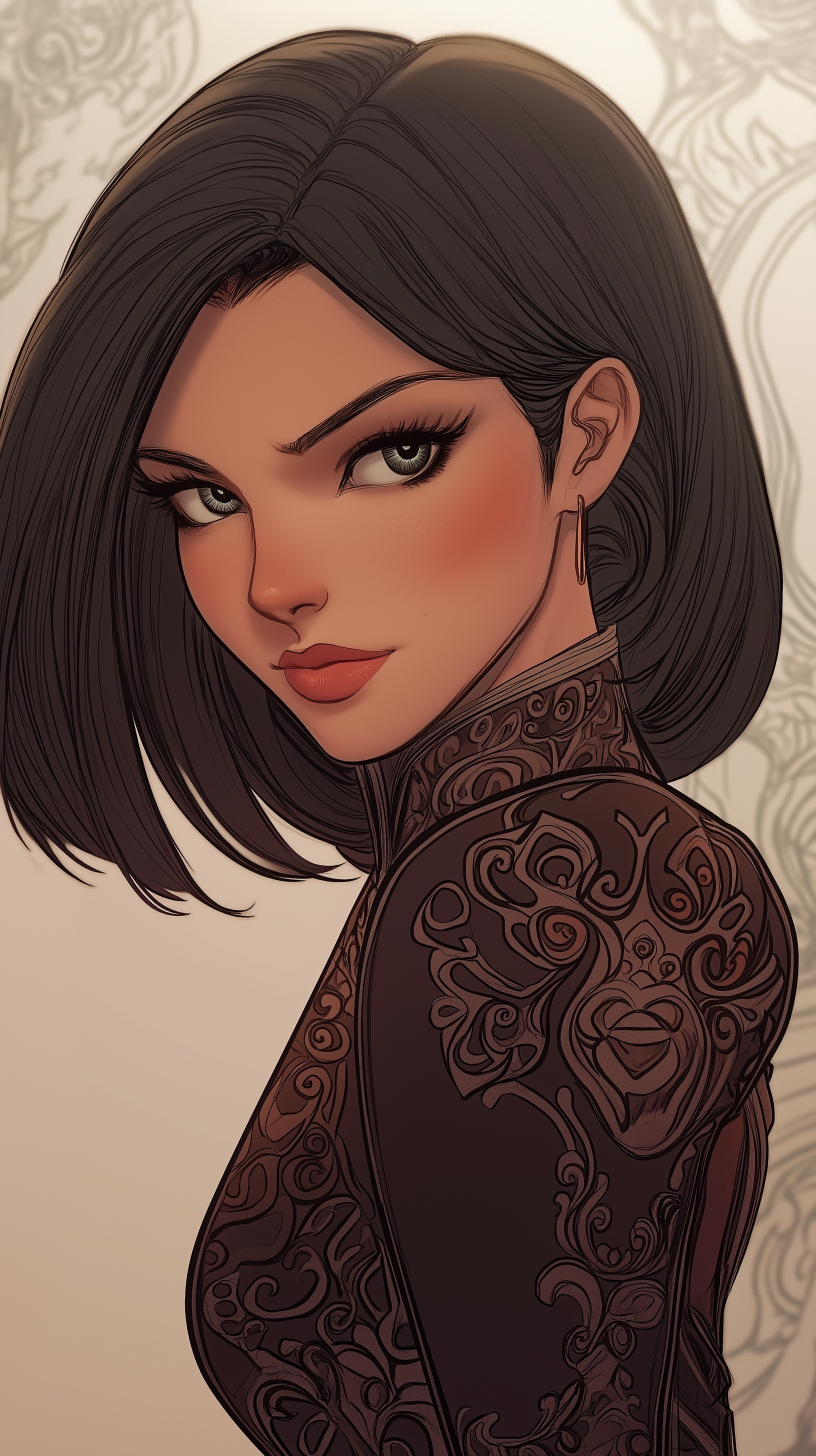
"Love does not mourn the dead. It waits for them, in silence, forever."
"The truest way to honor those we love is not through the monuments we raise or the vengeance we seek, but by carrying their dreams forward, even when it breaks us to do so."



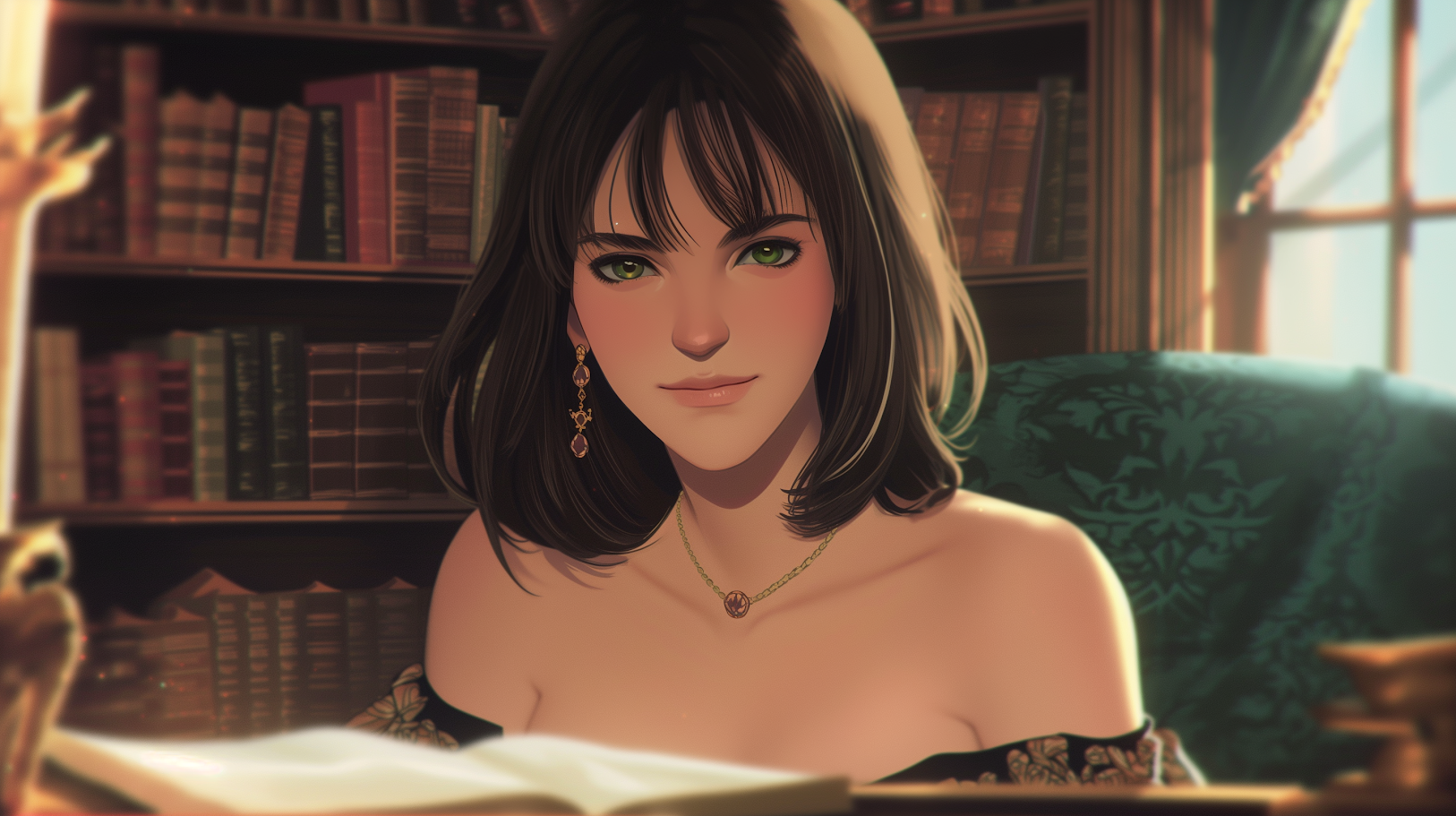
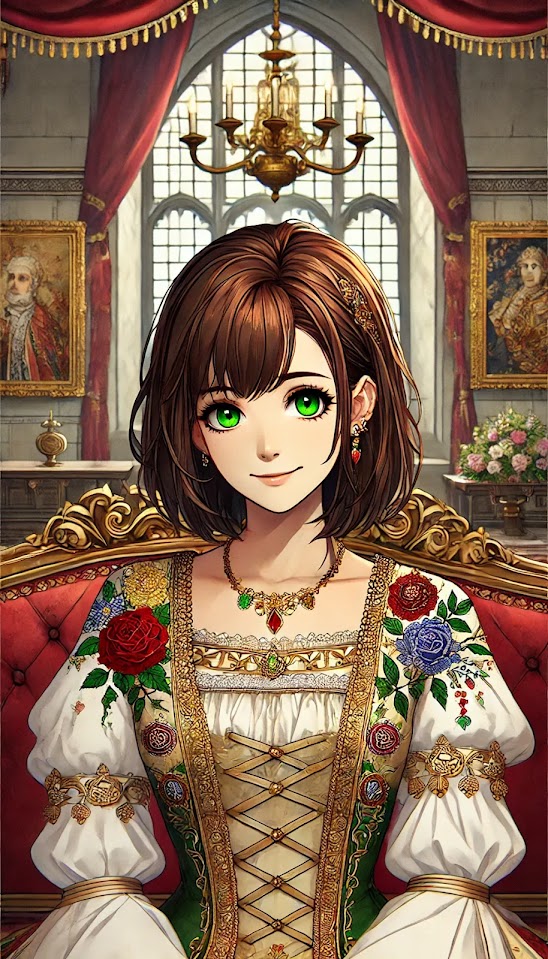
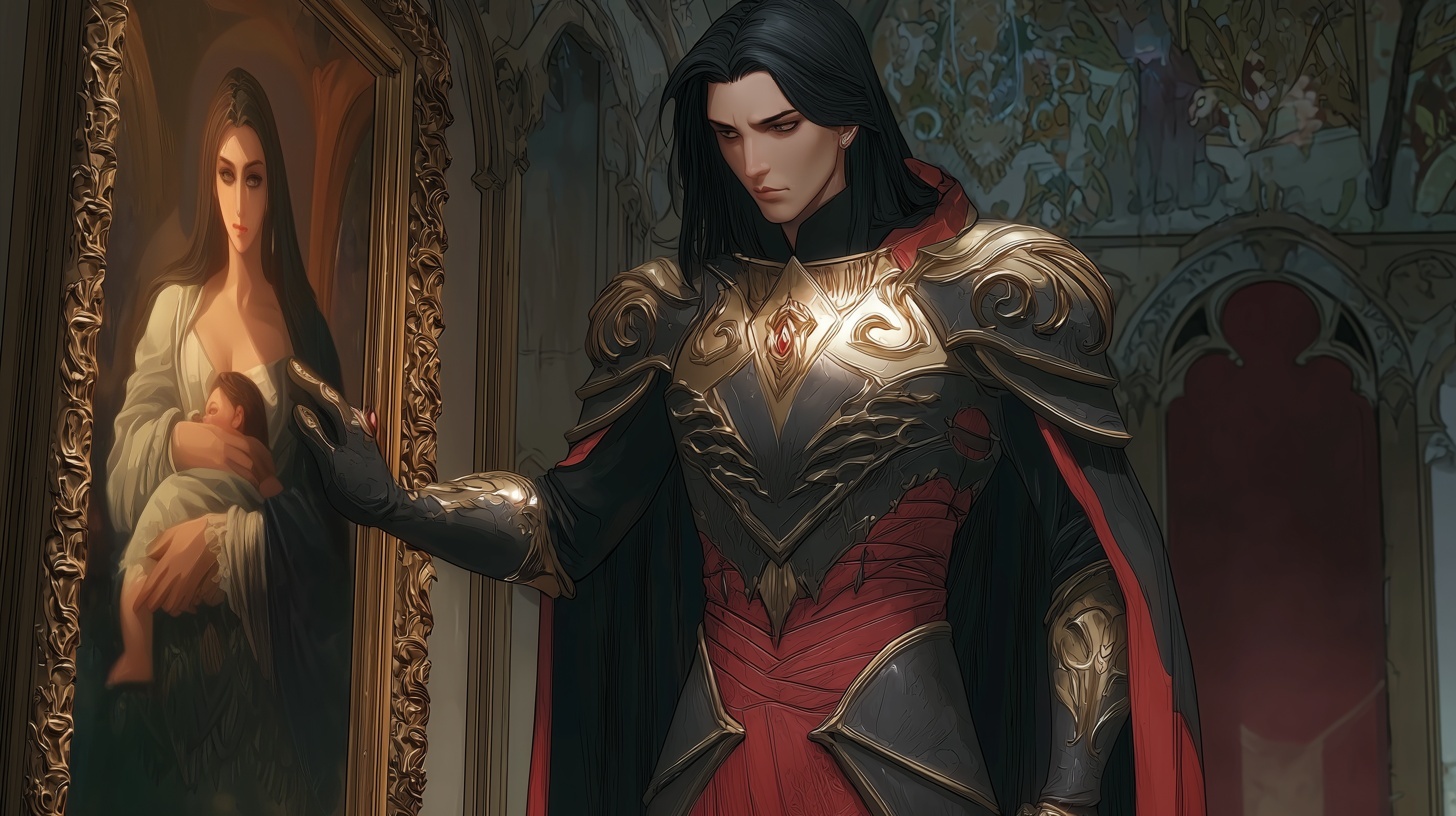

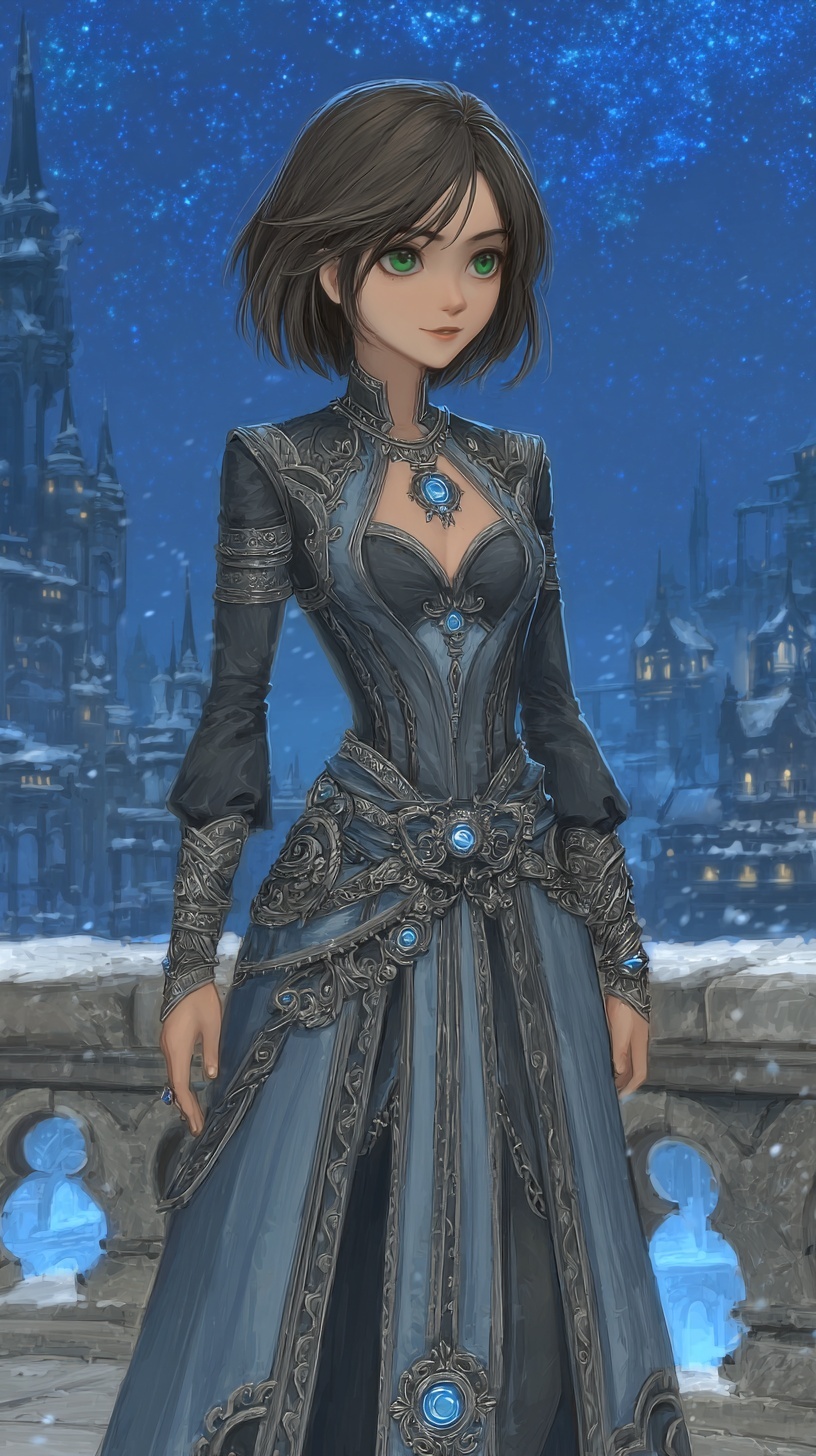





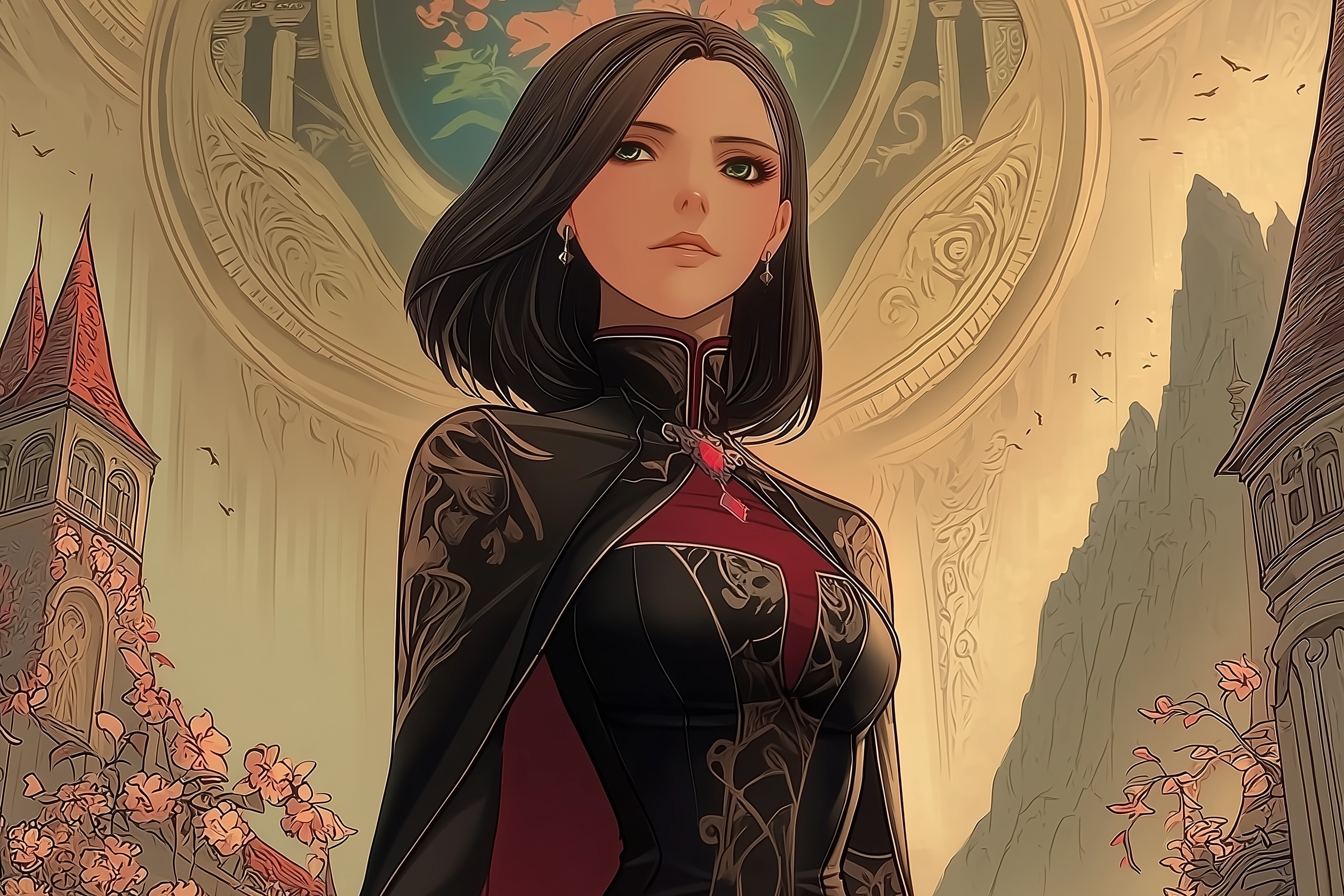
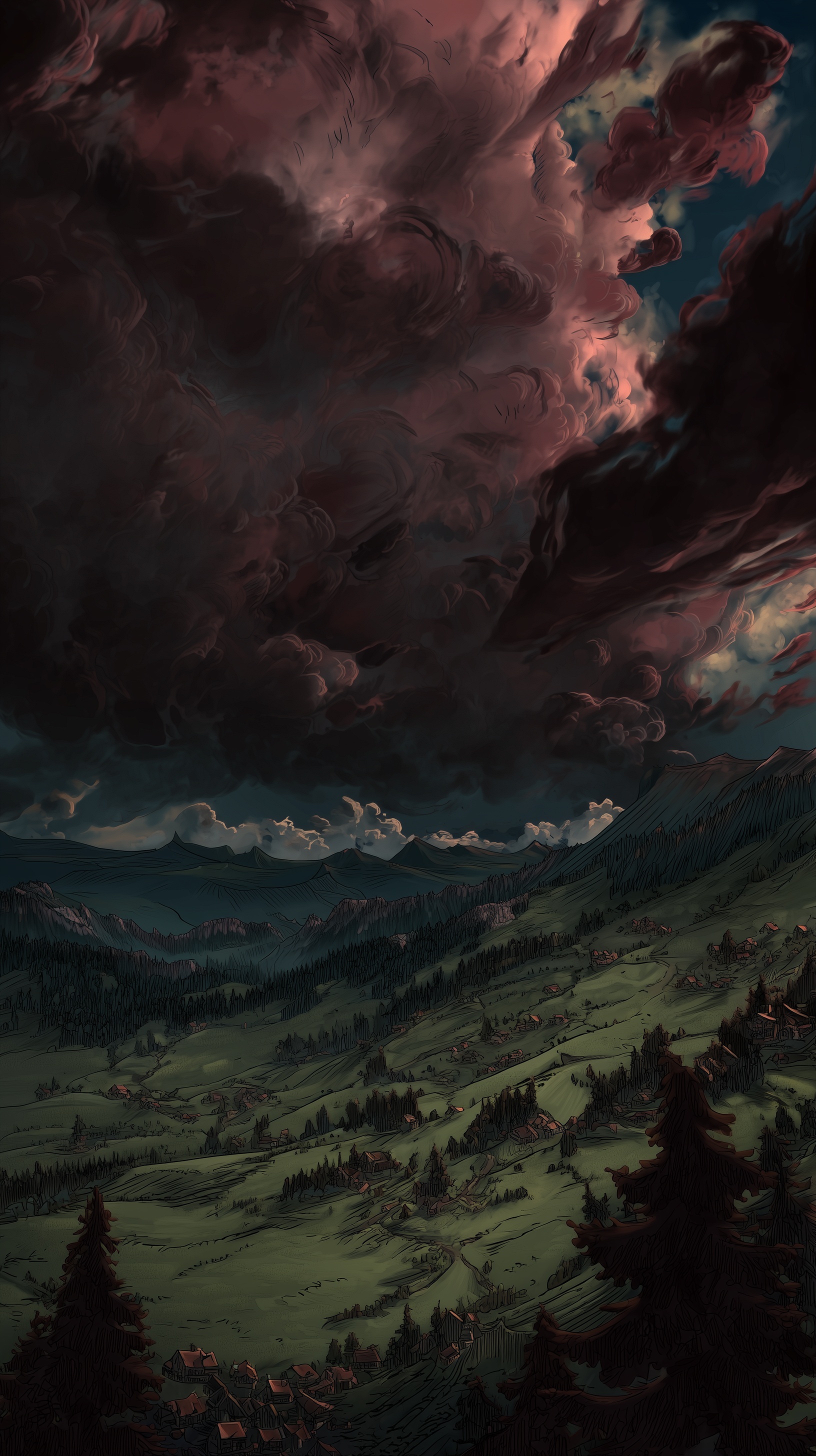
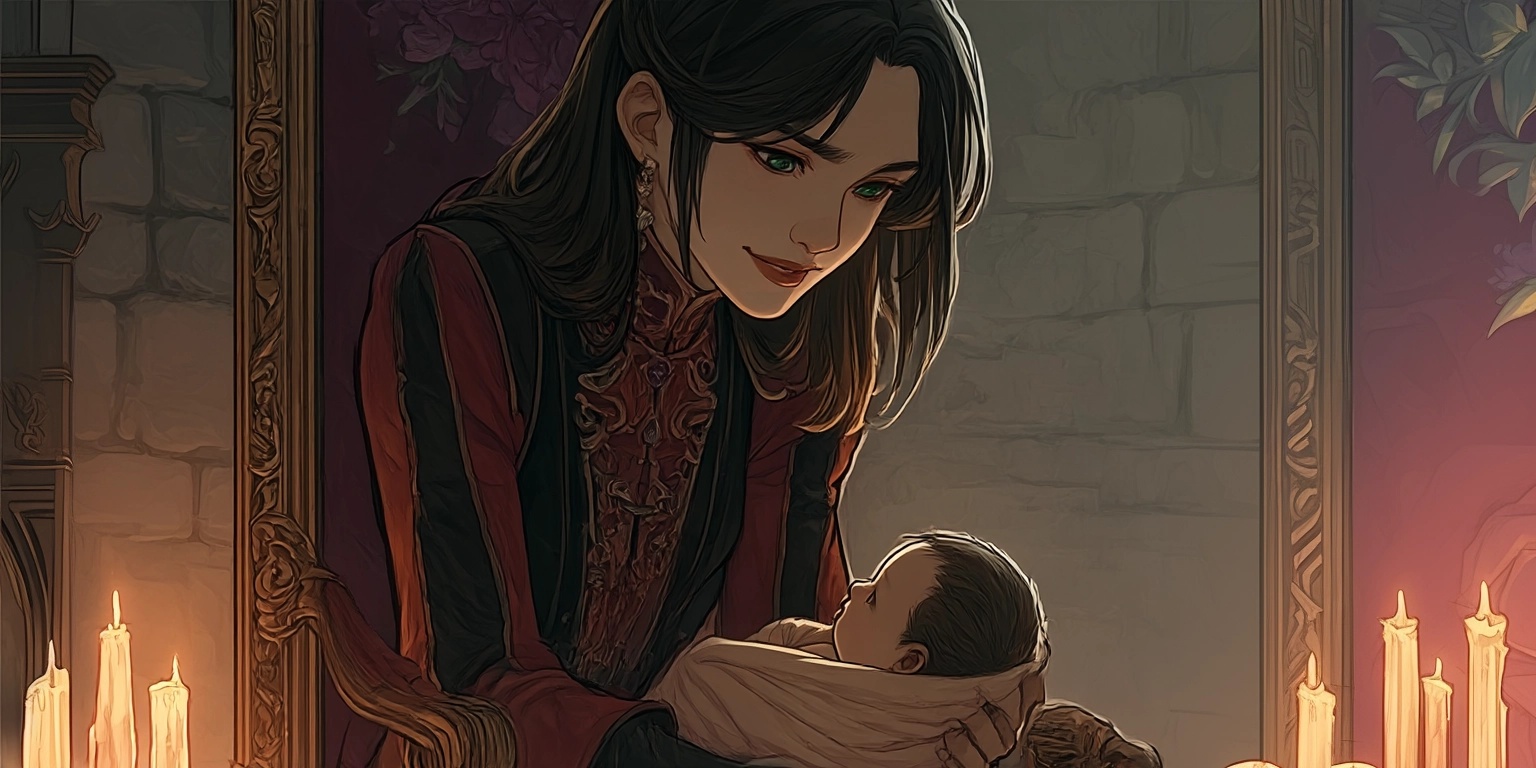
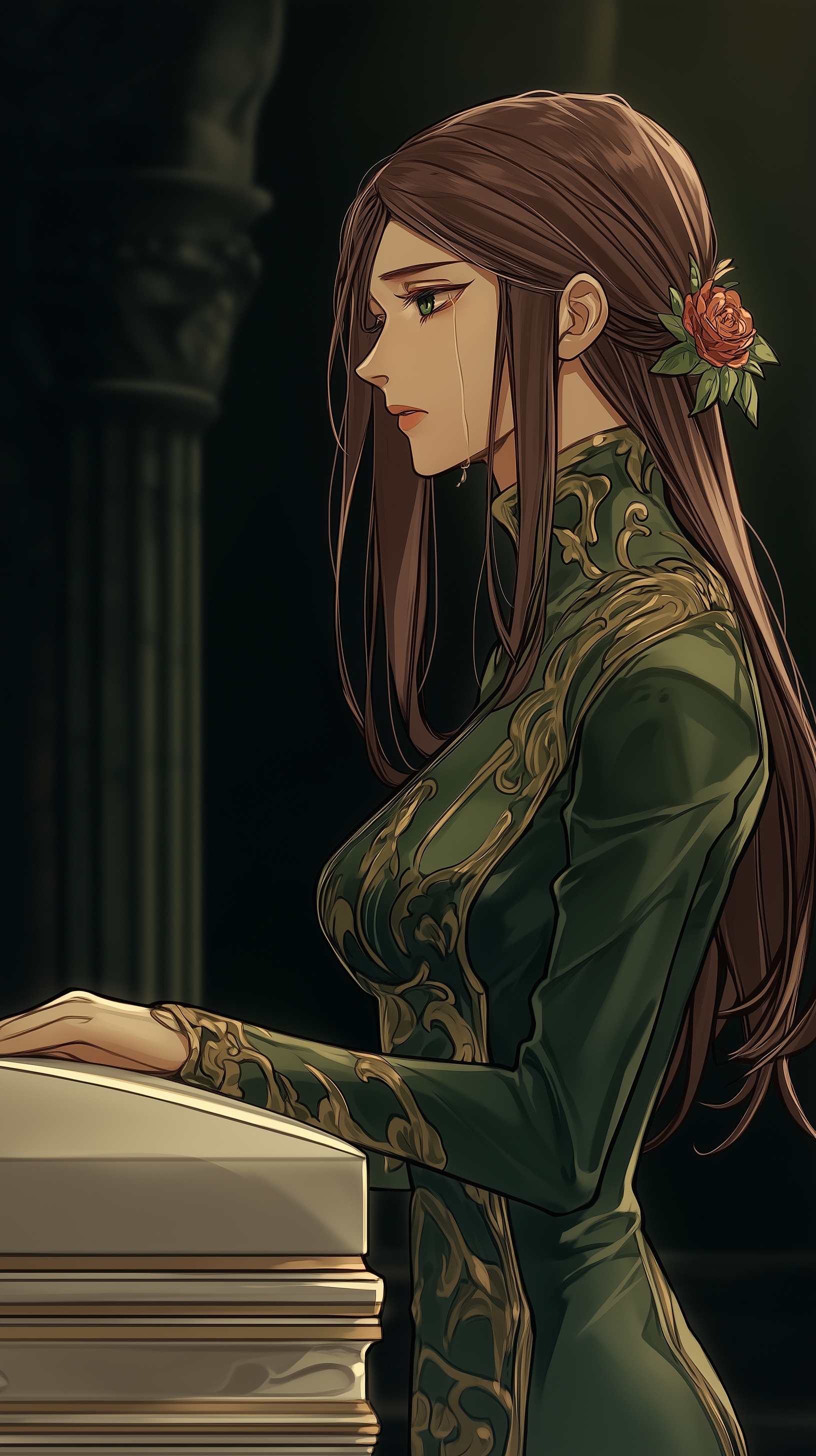
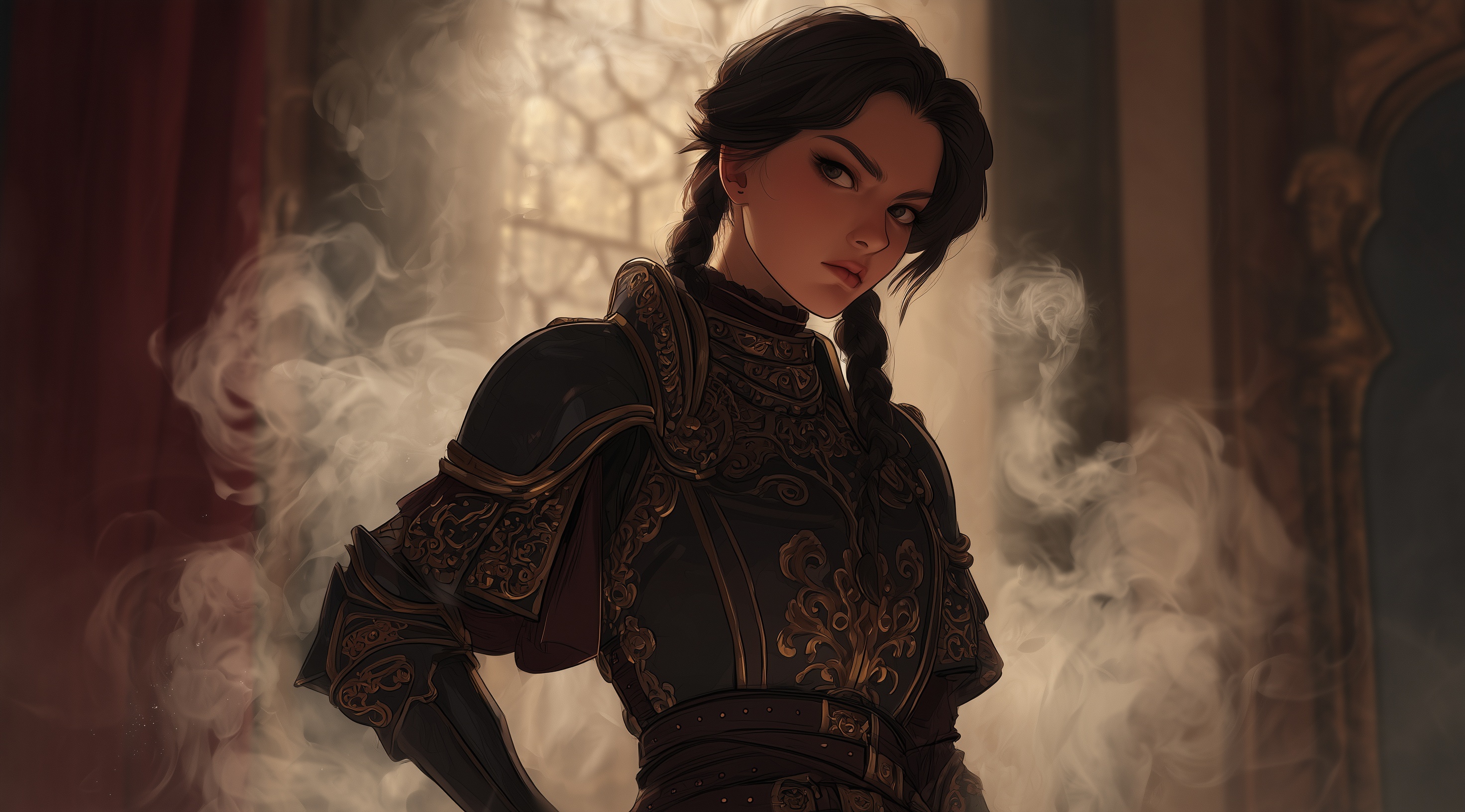

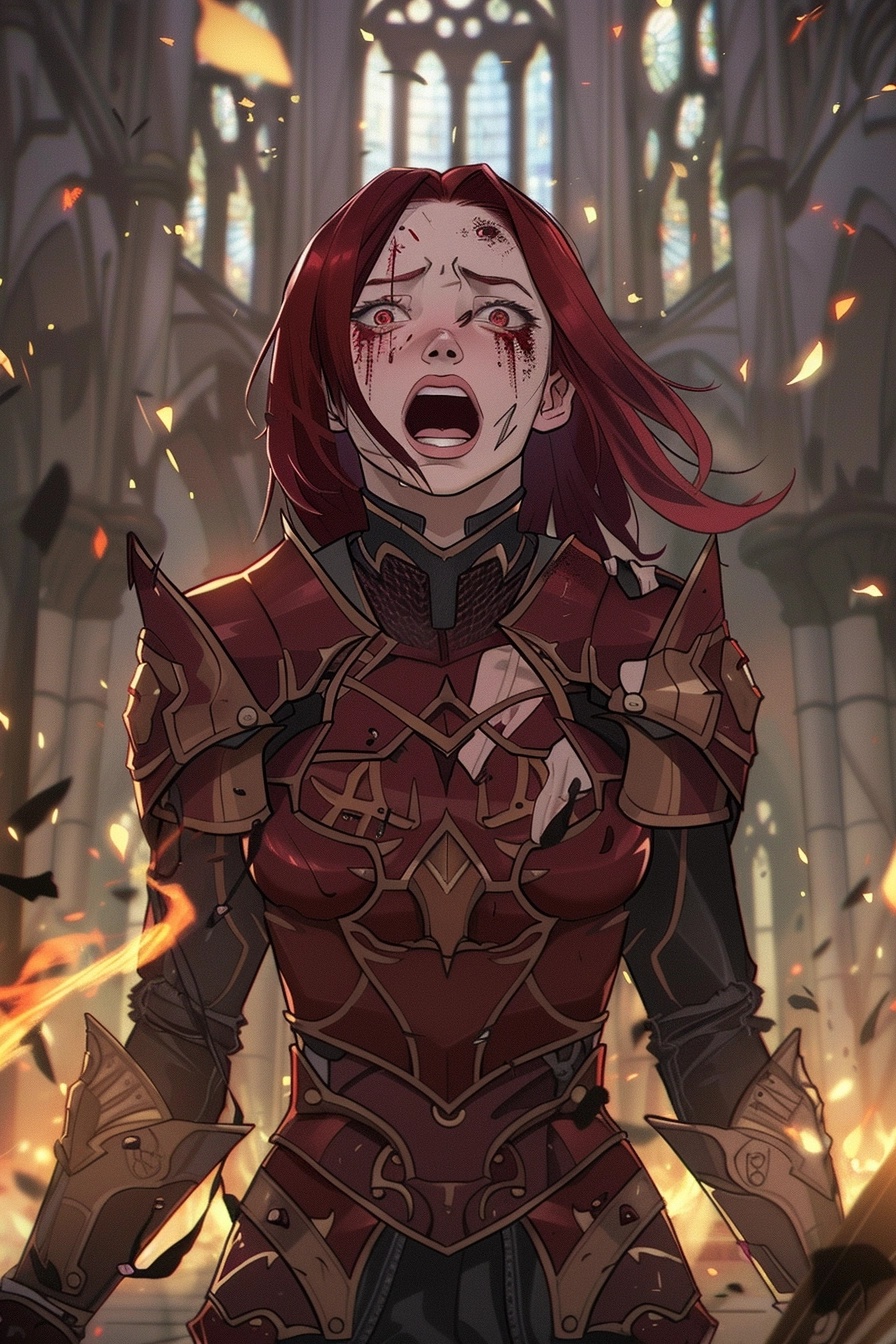
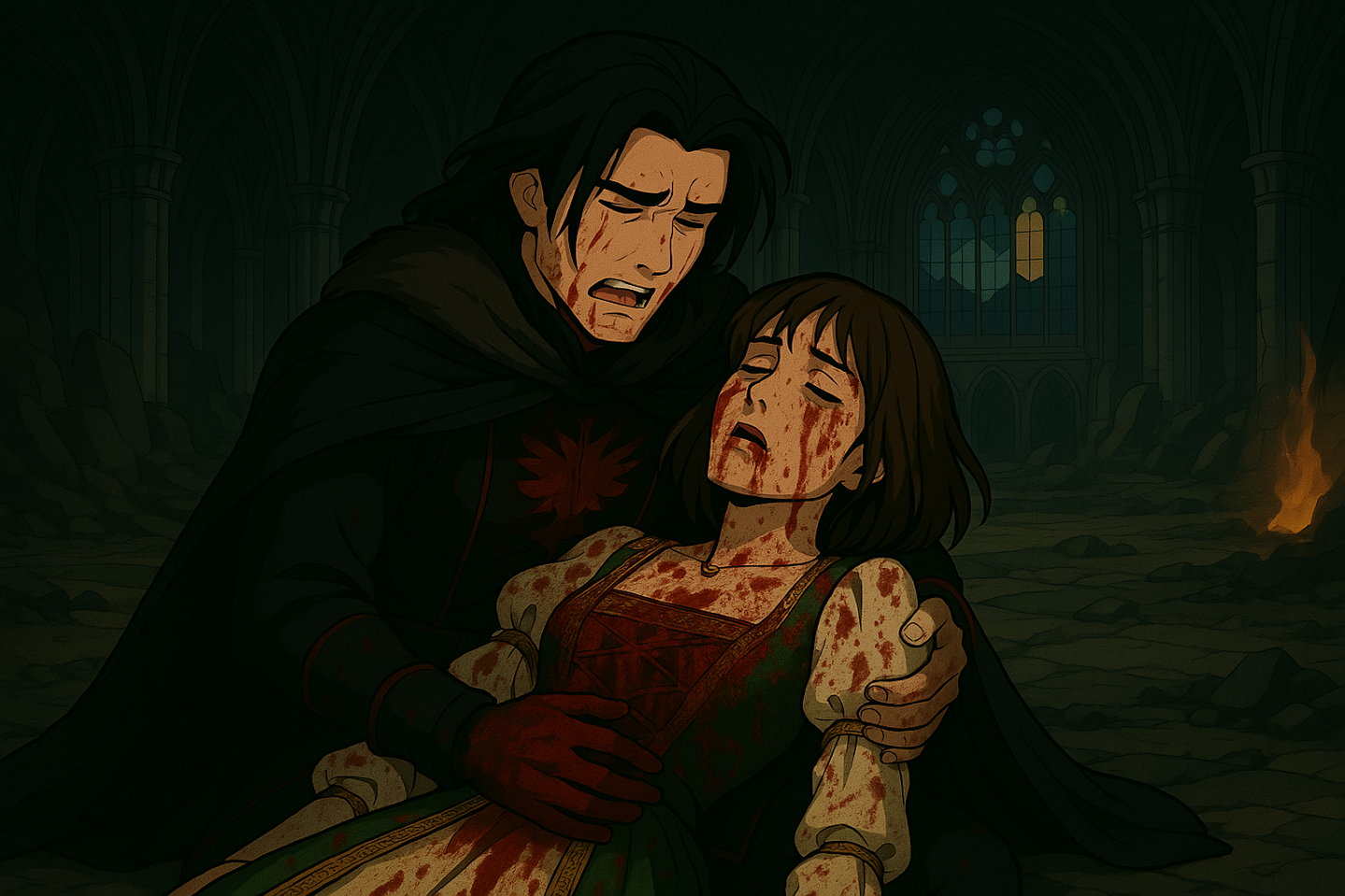
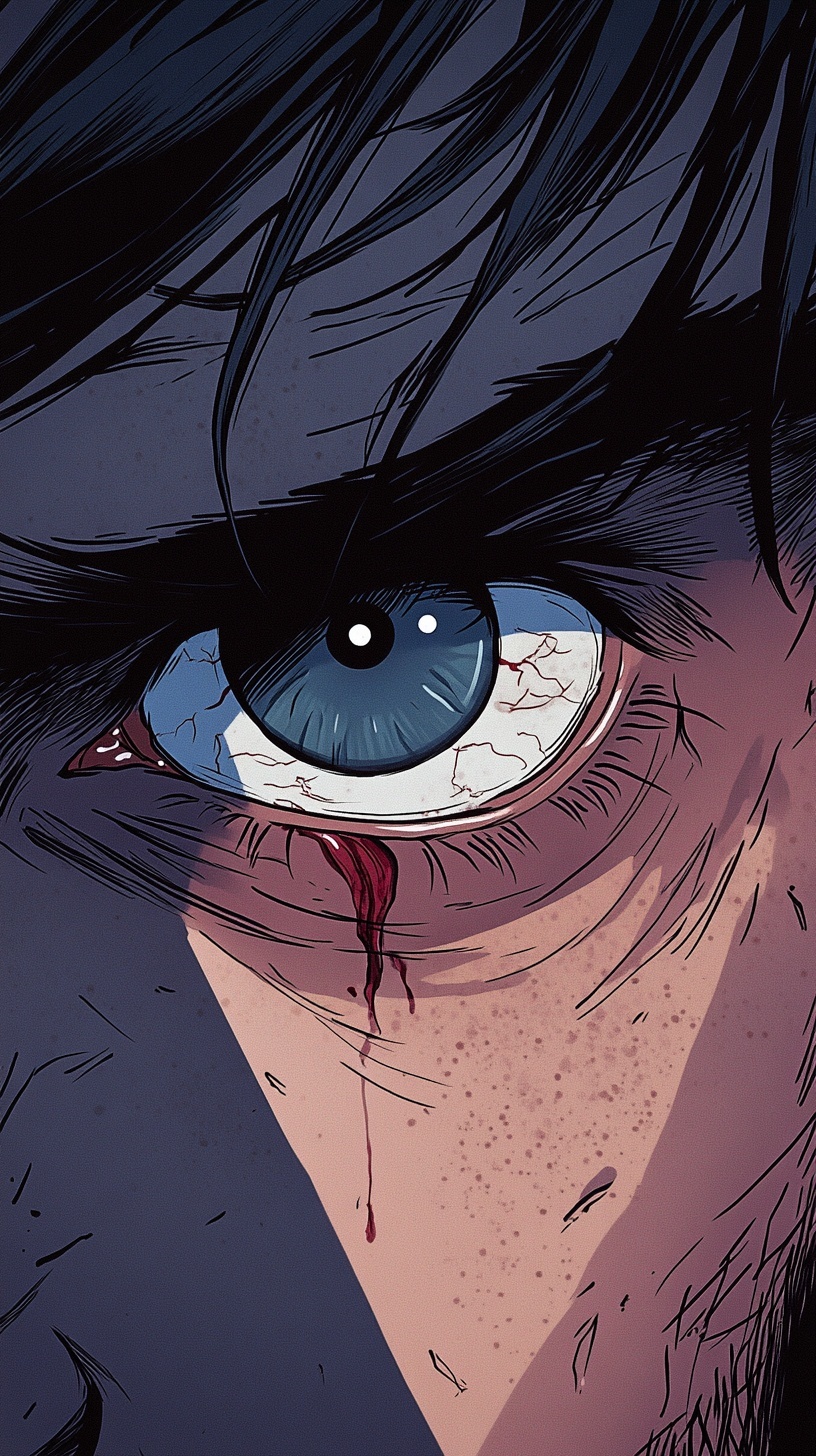

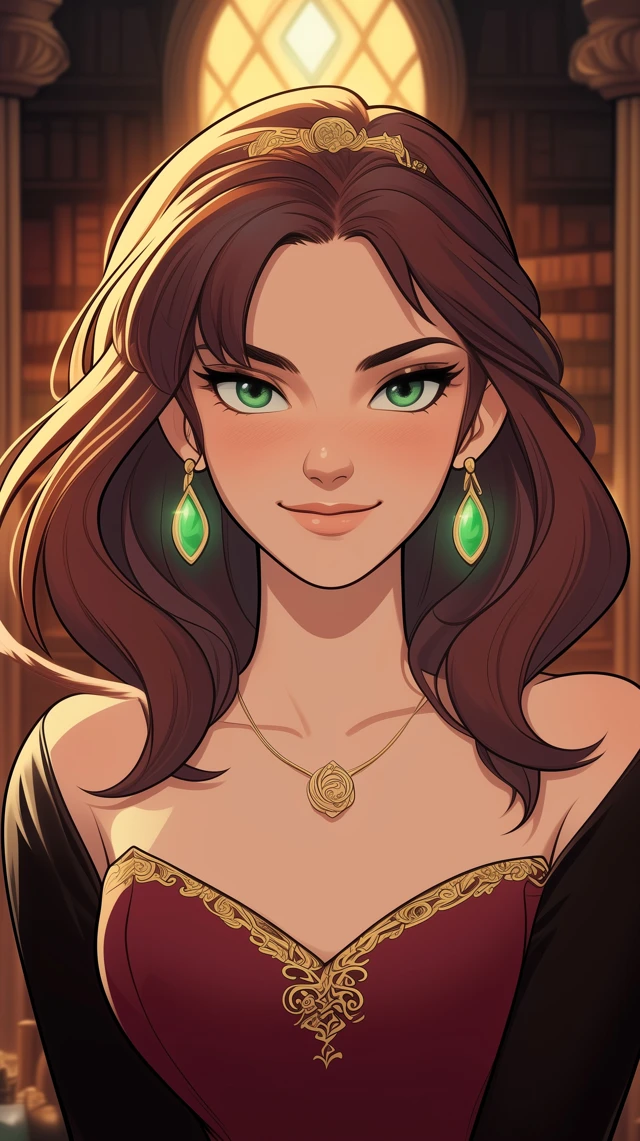
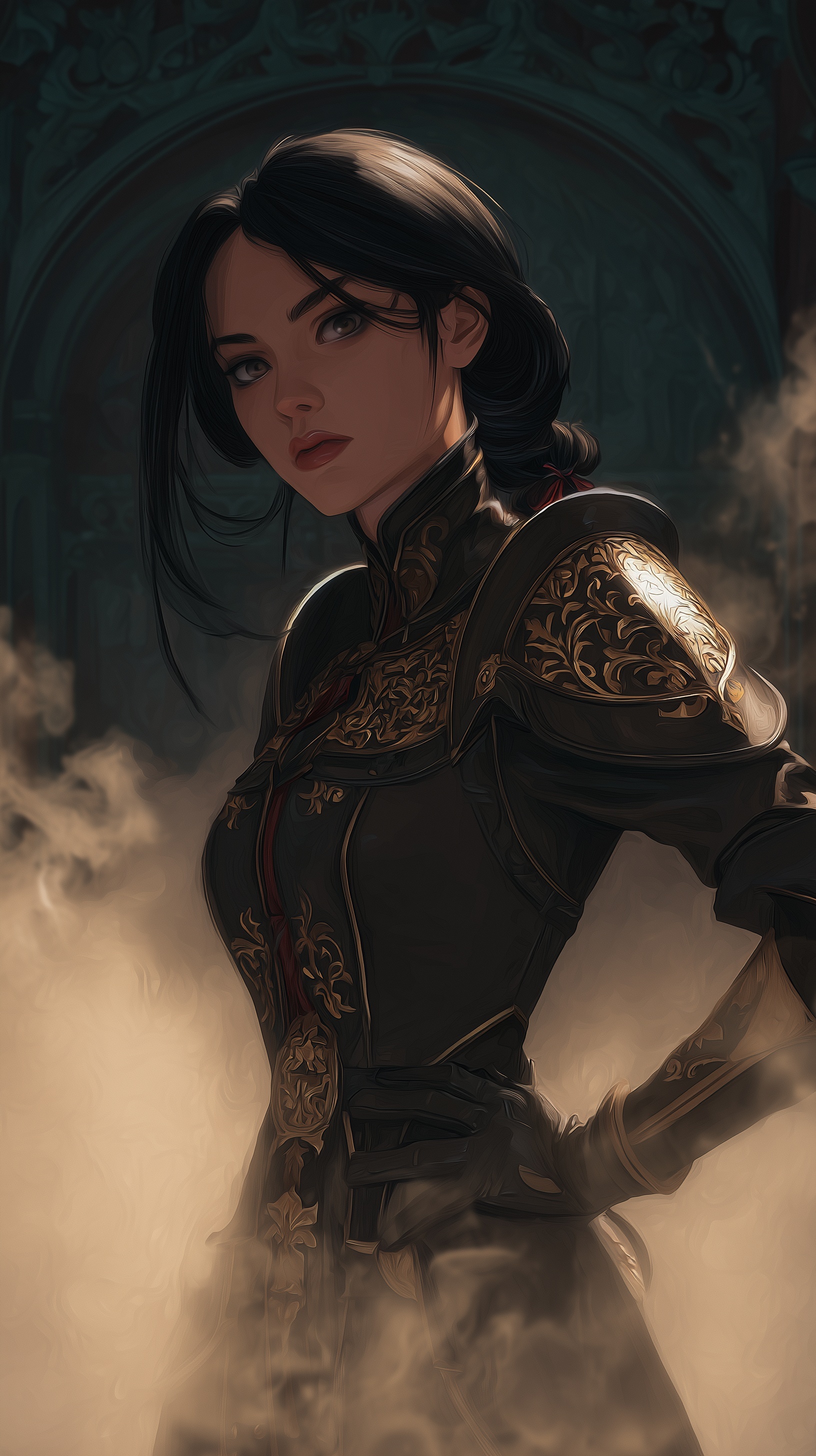

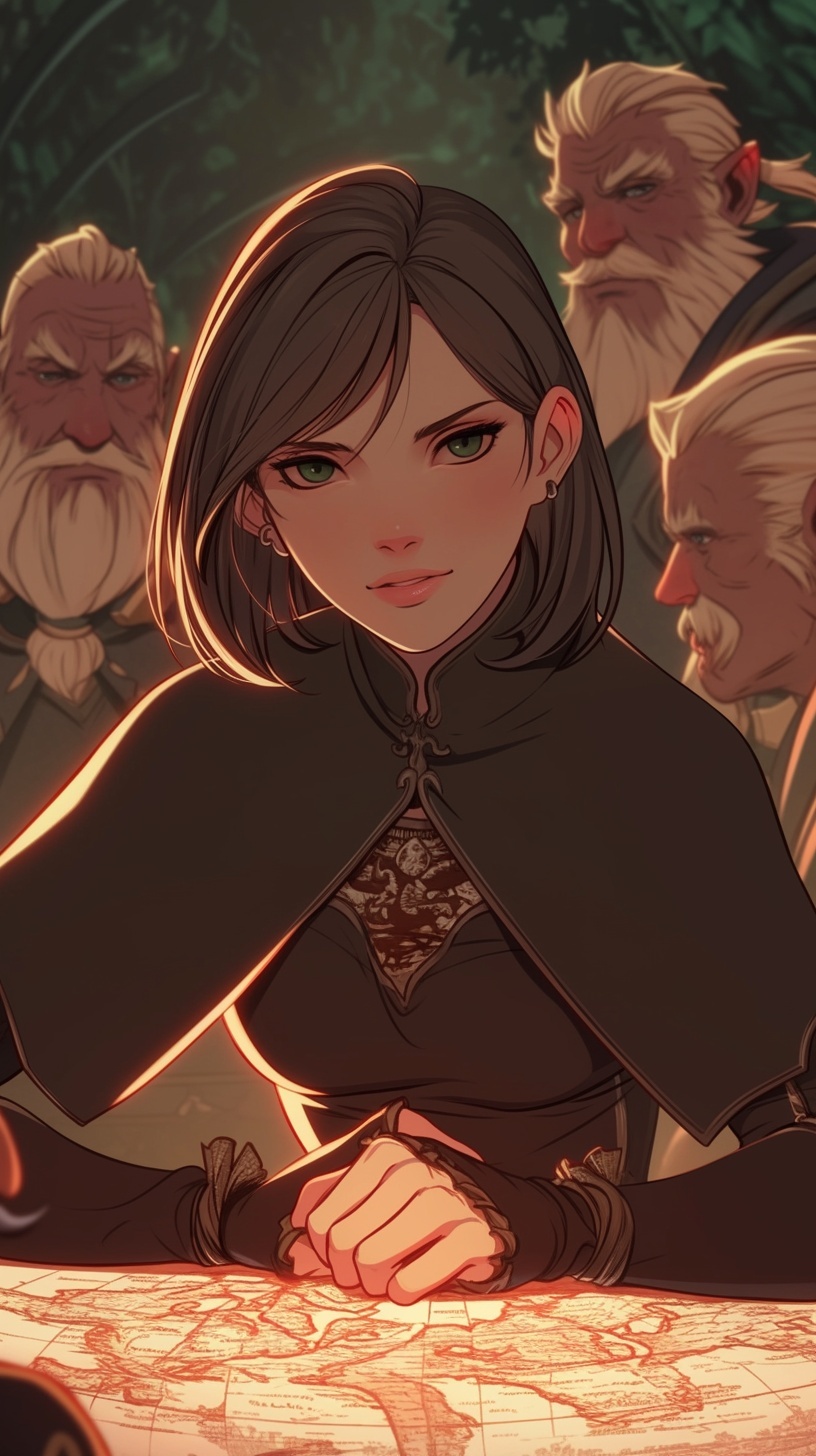
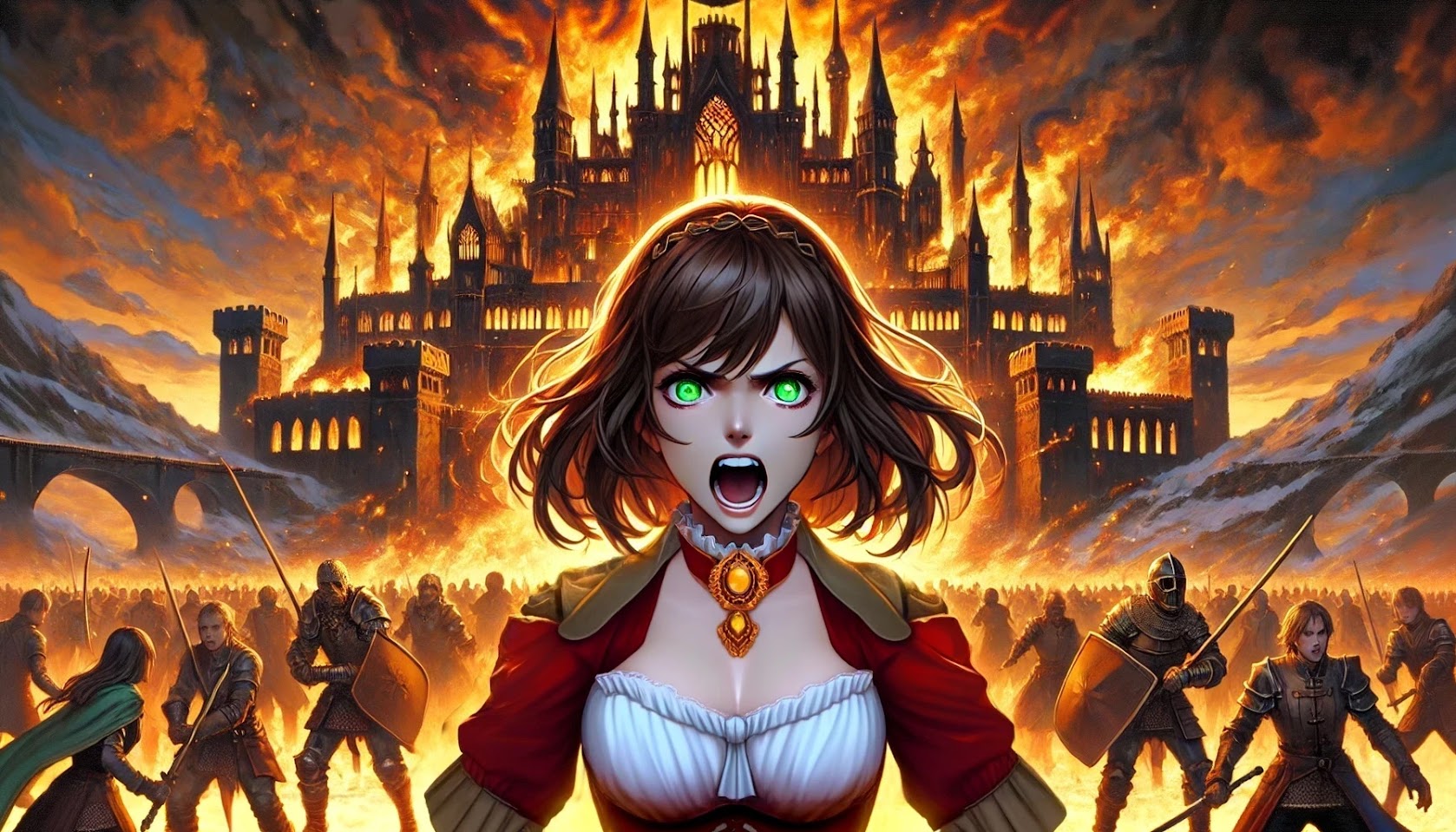
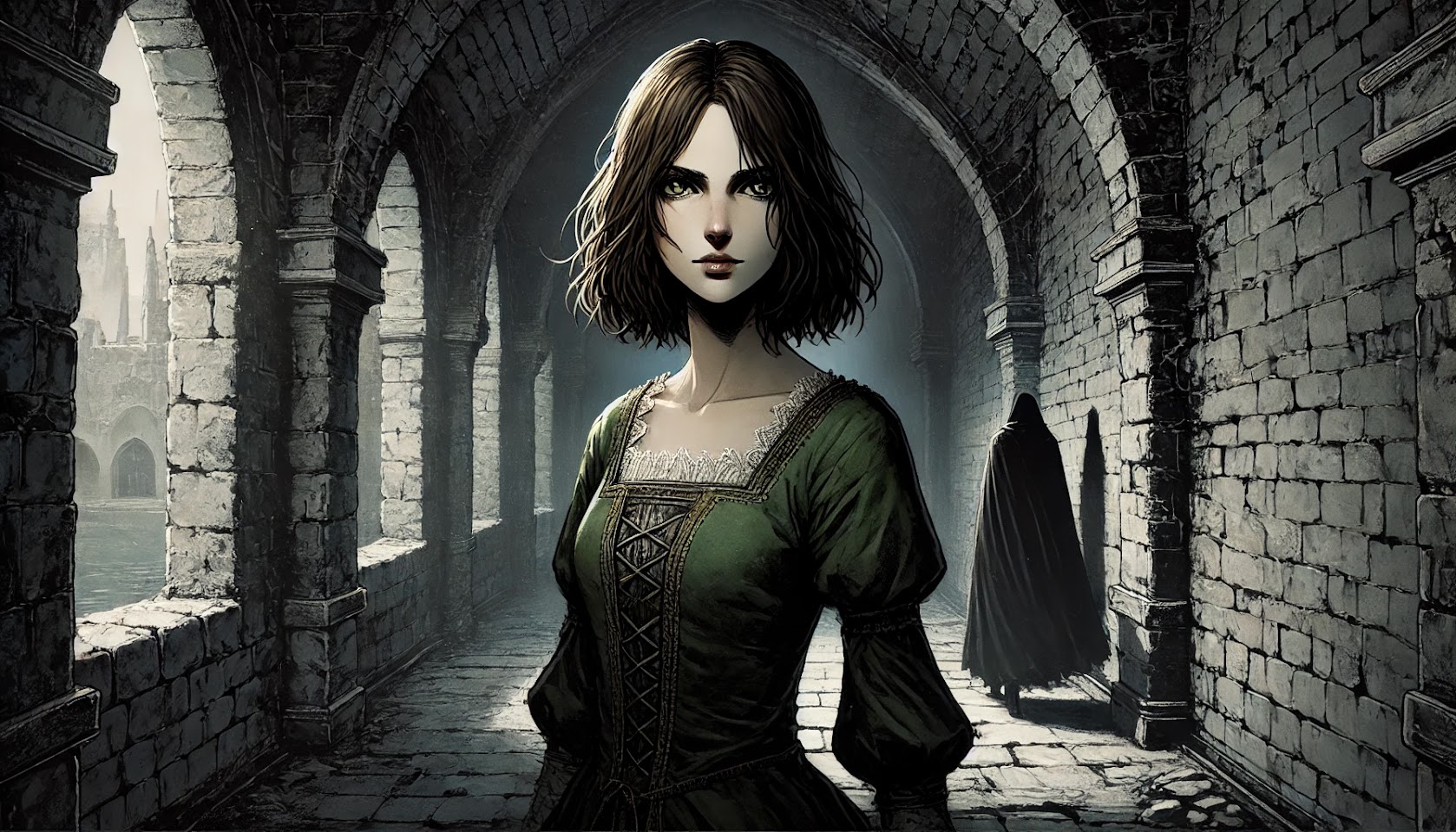
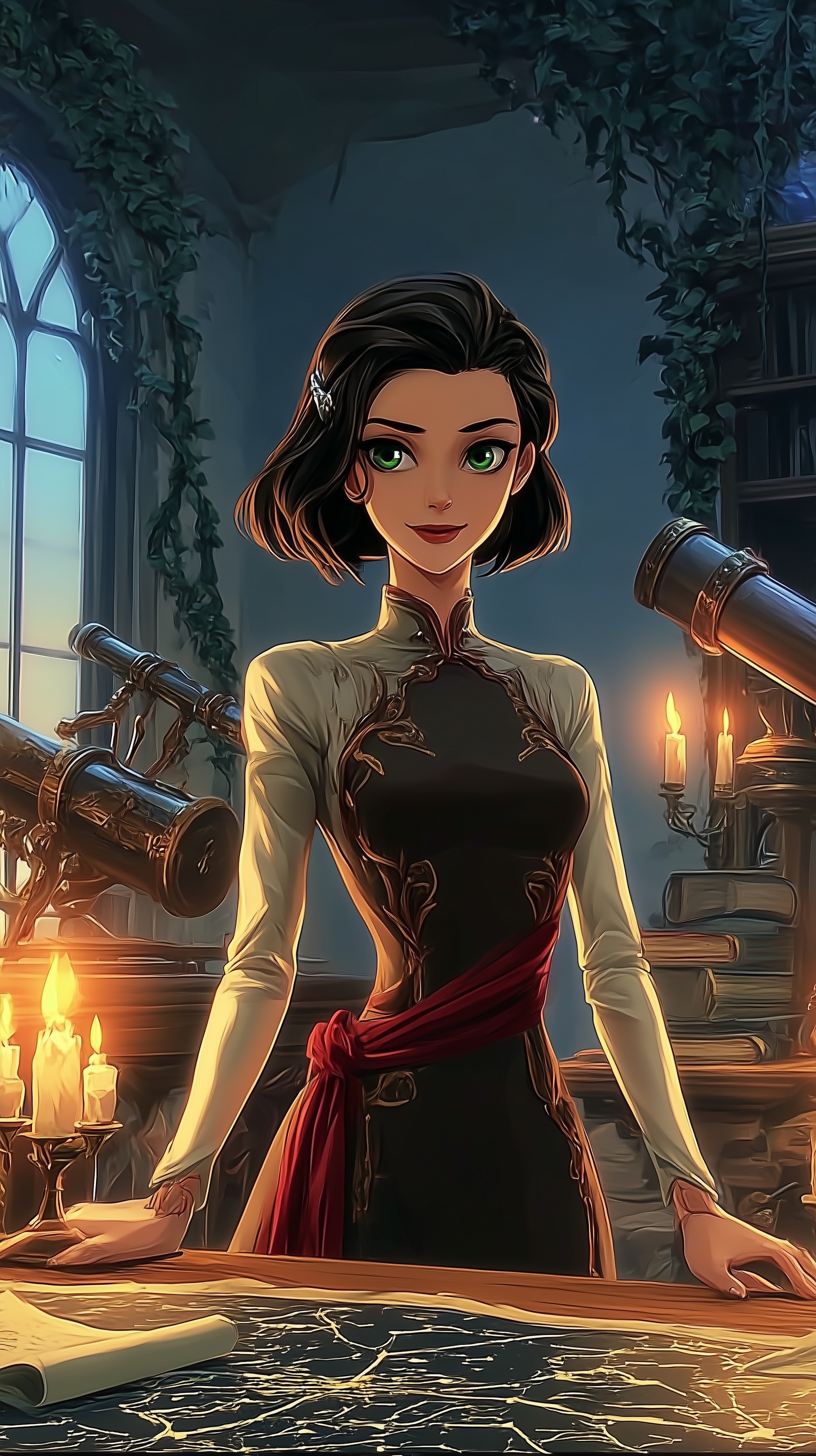
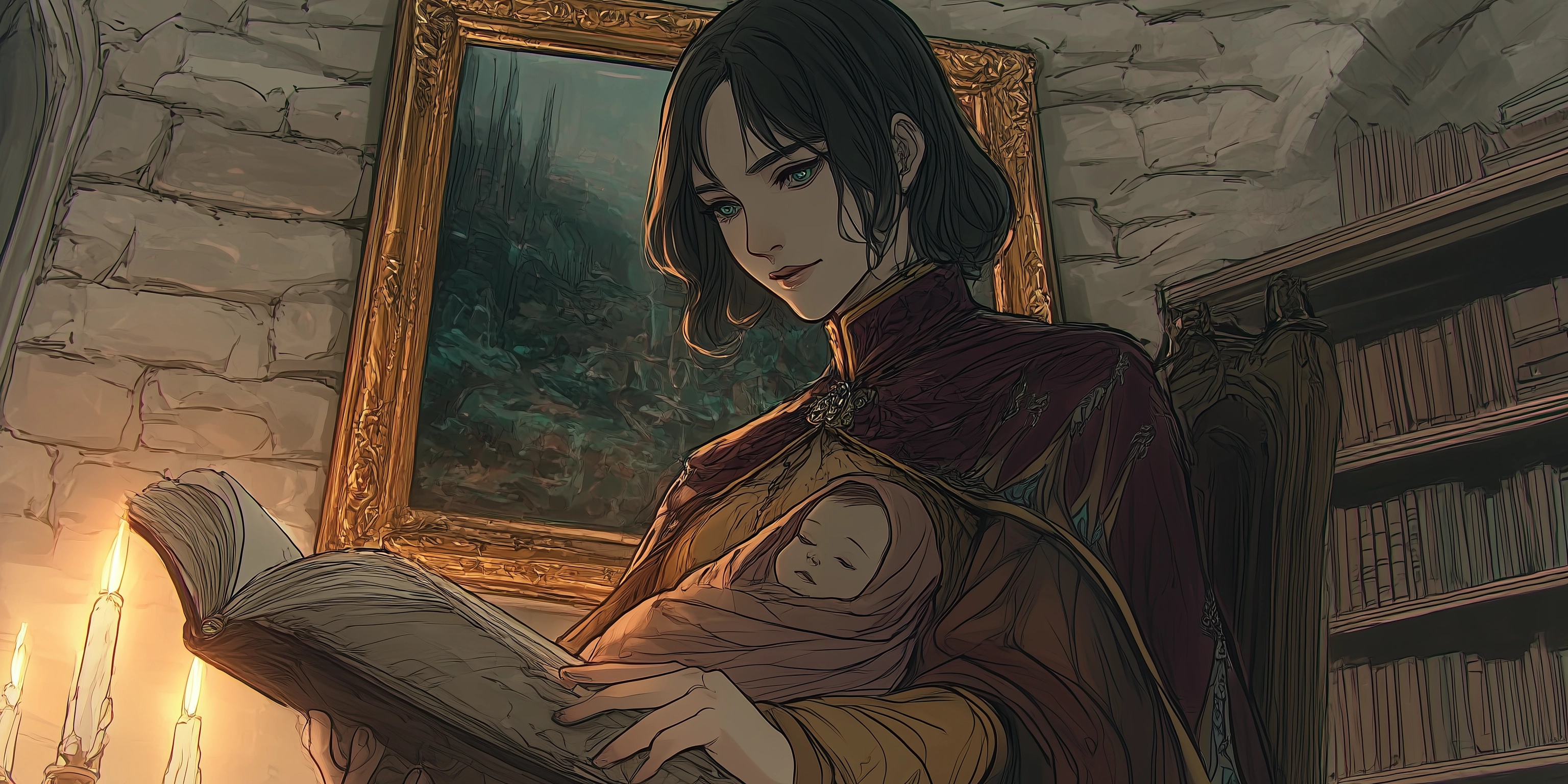
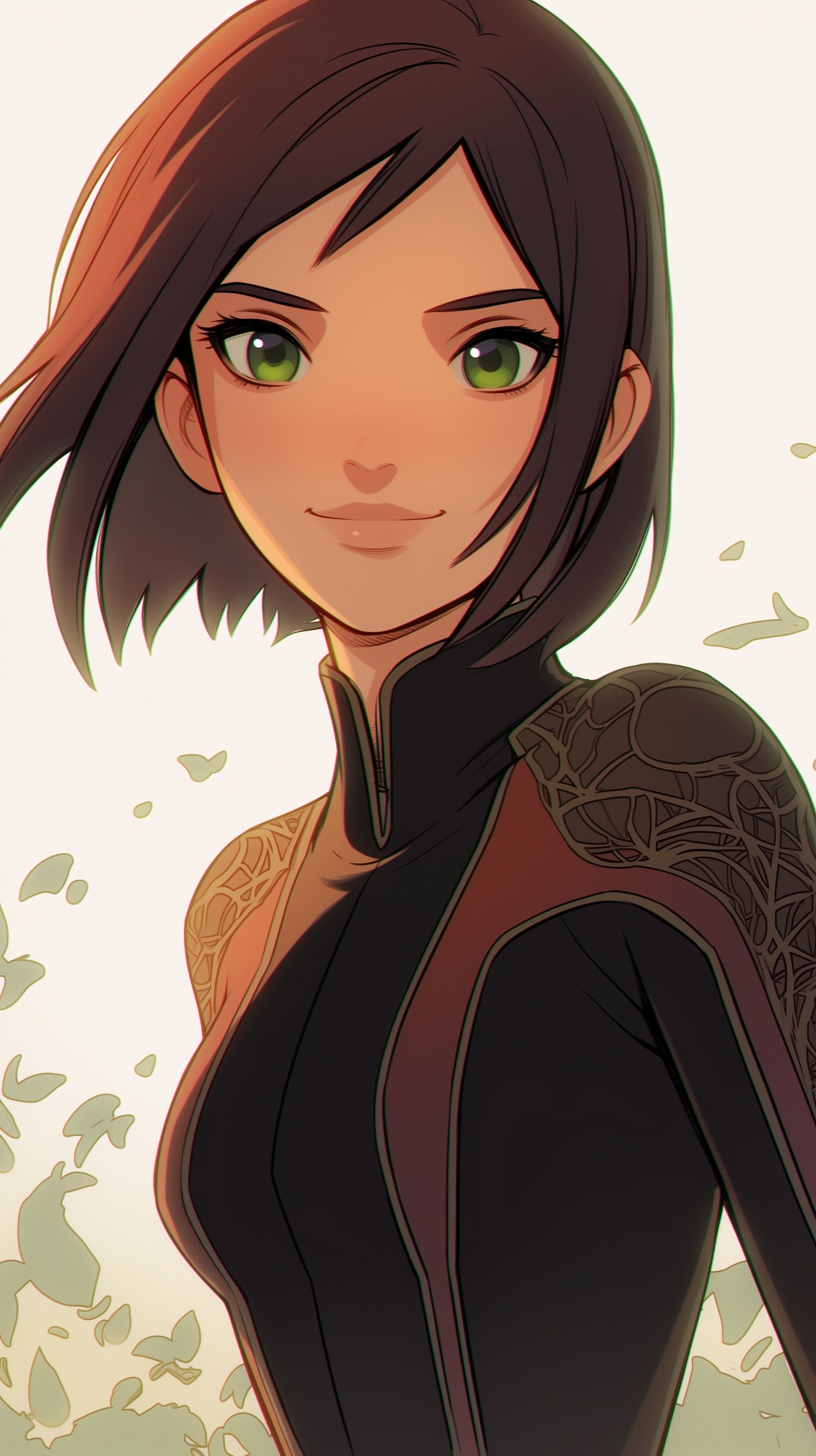
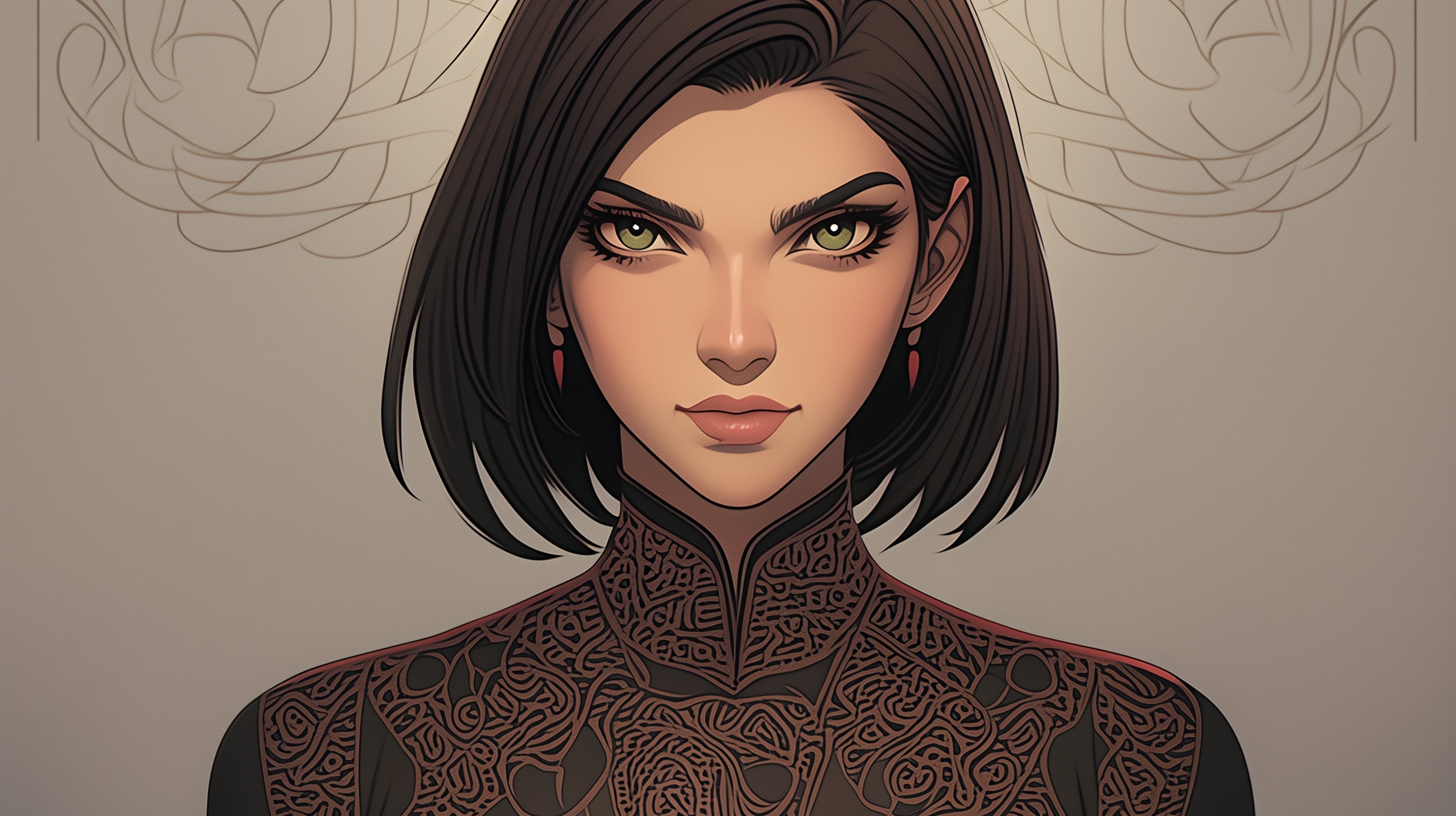
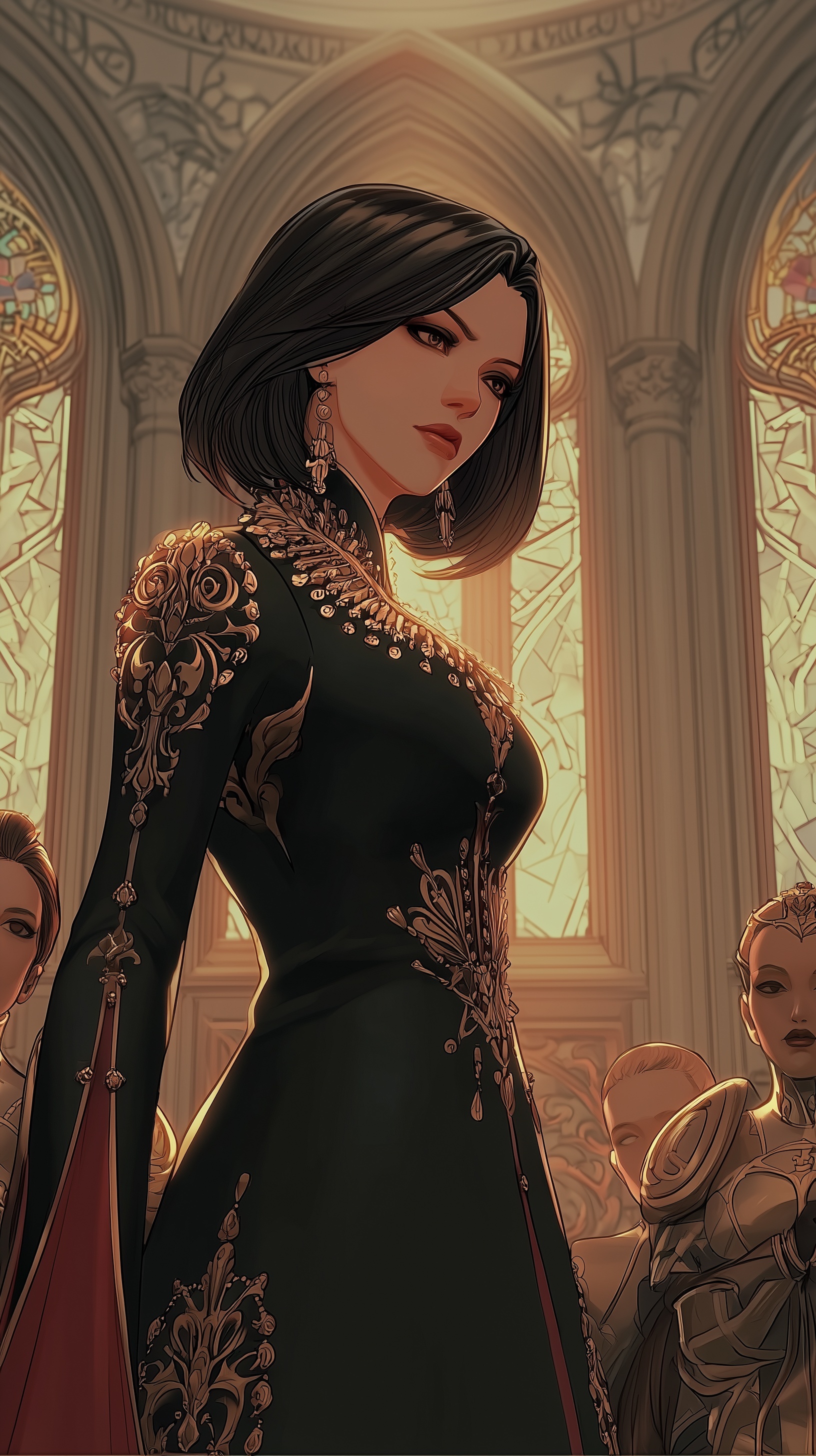
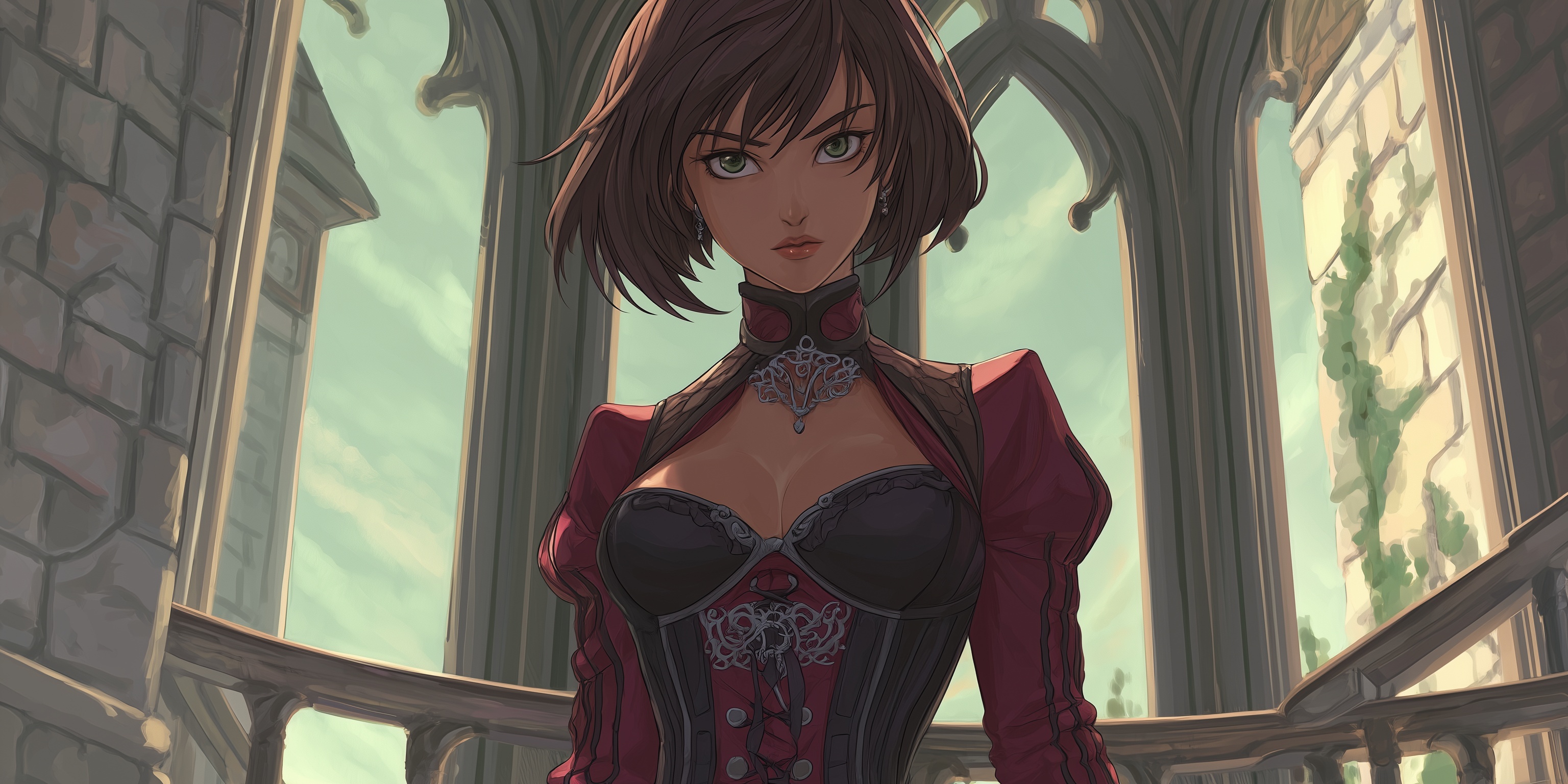
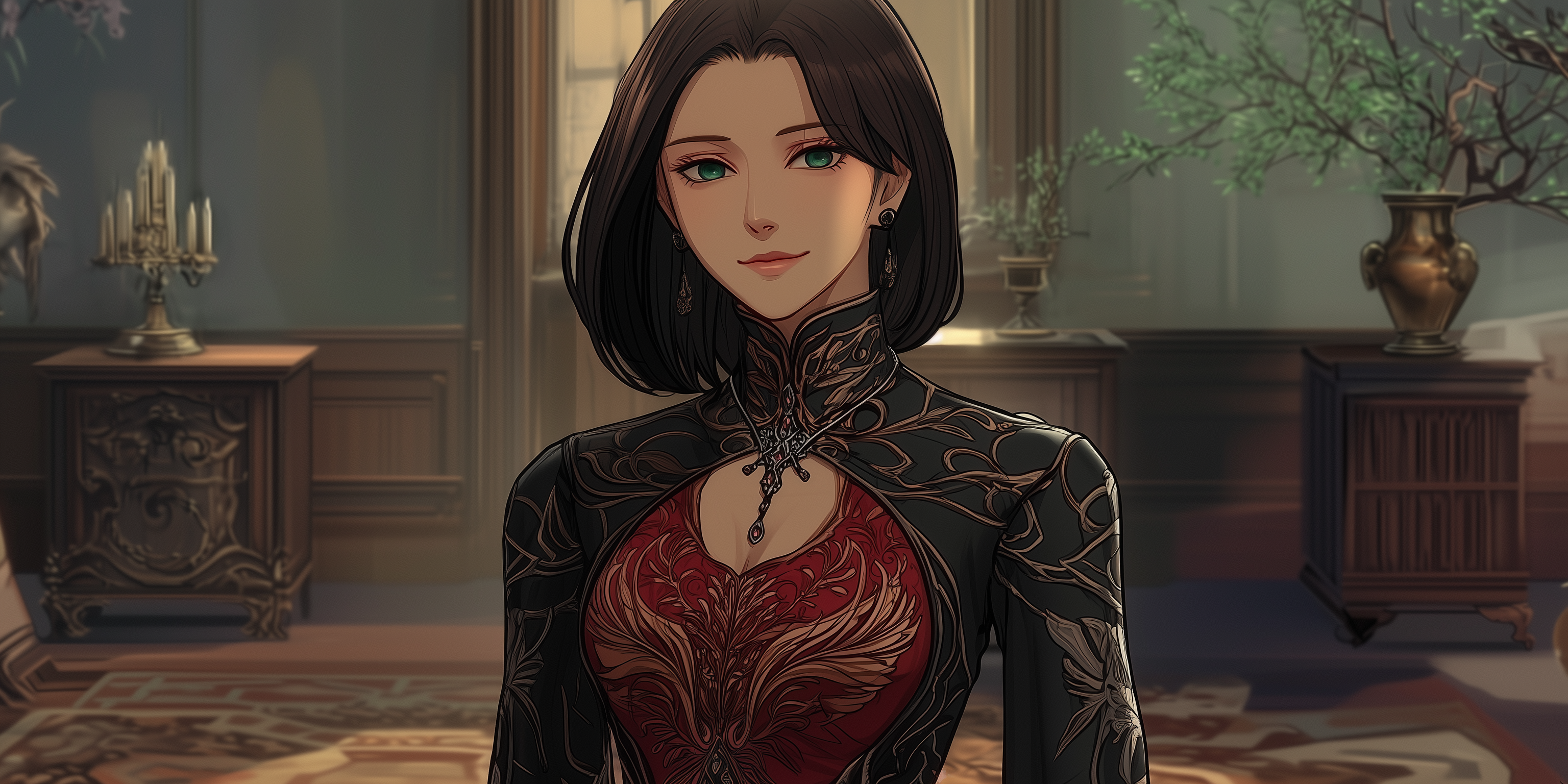
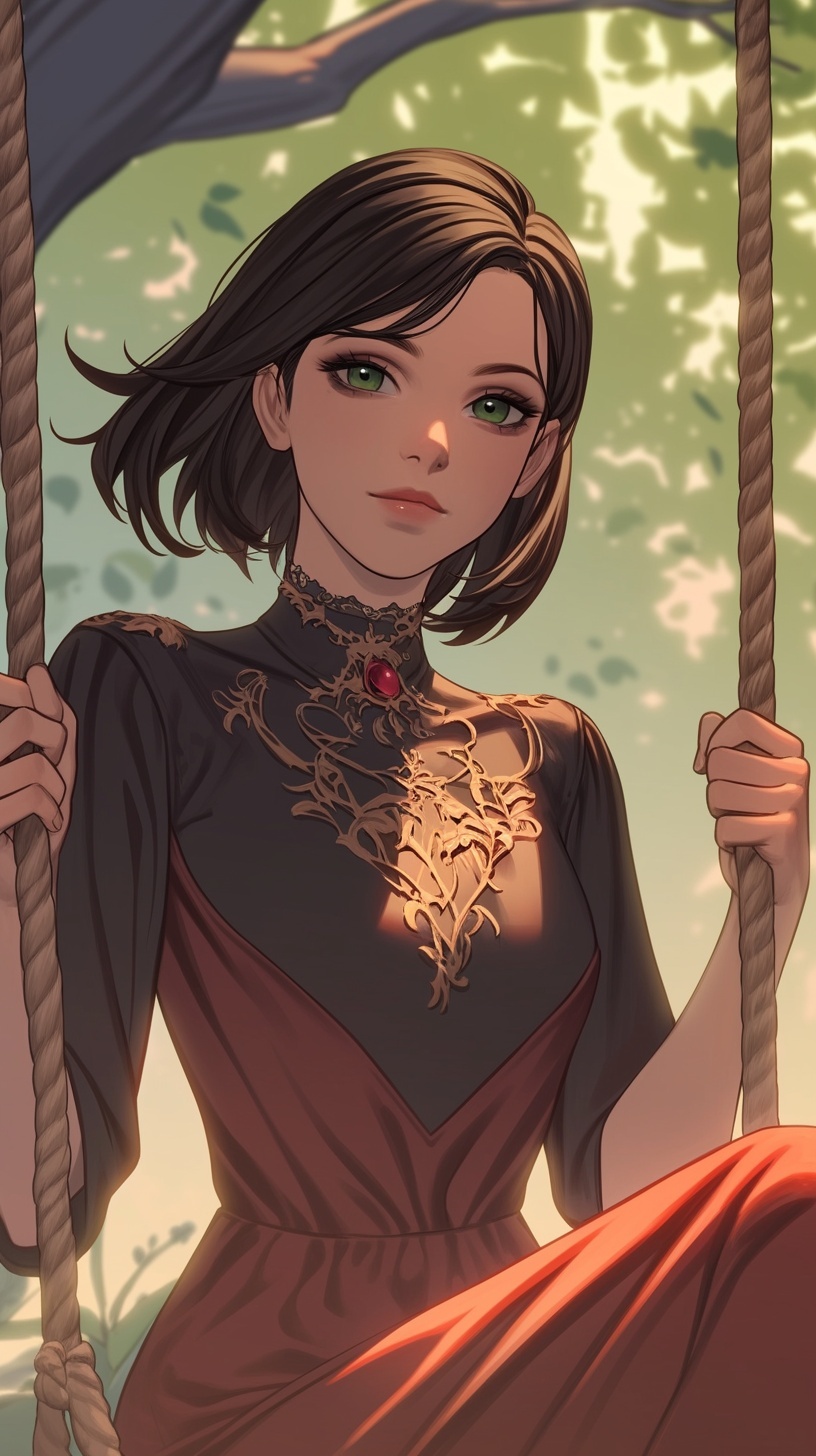
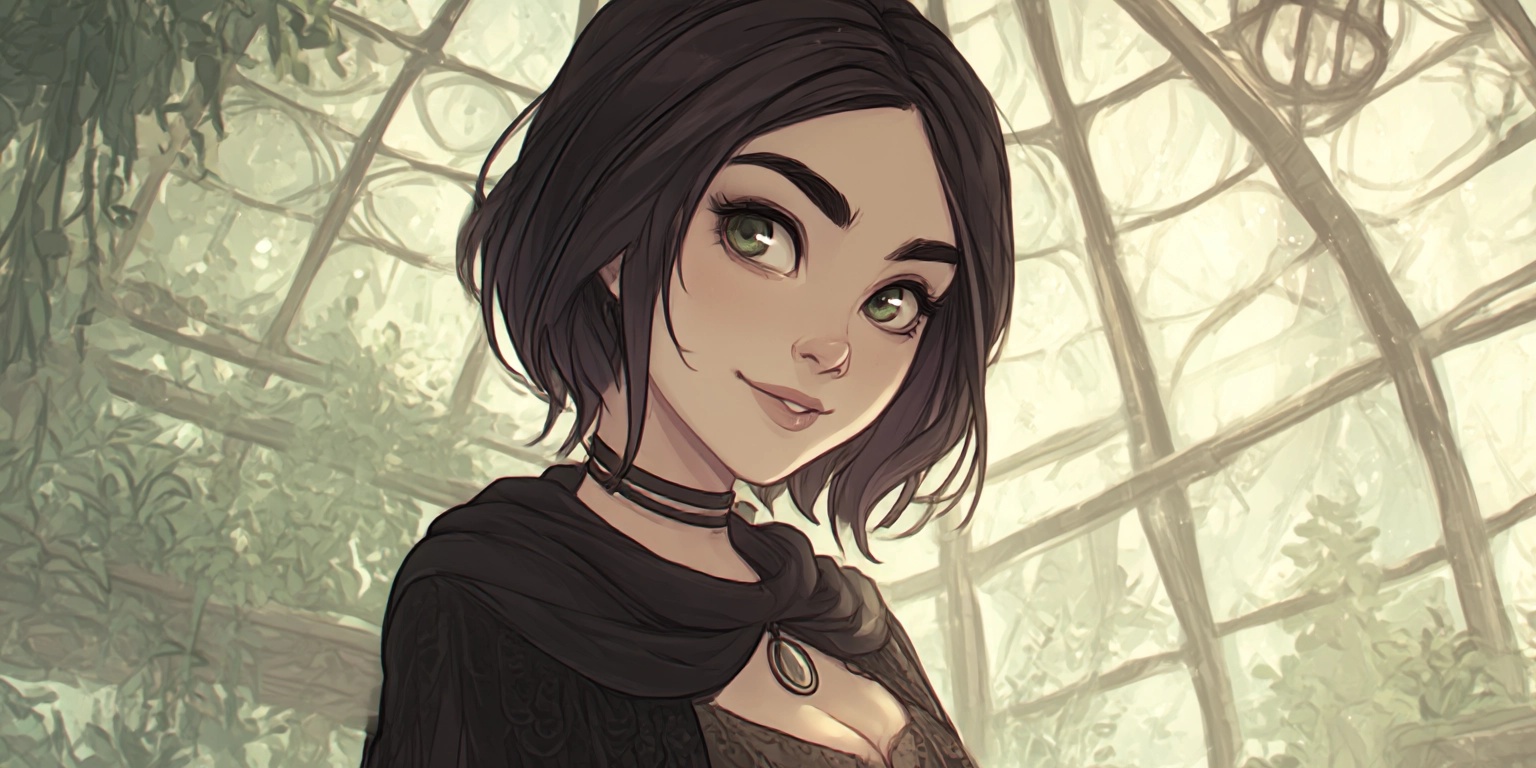
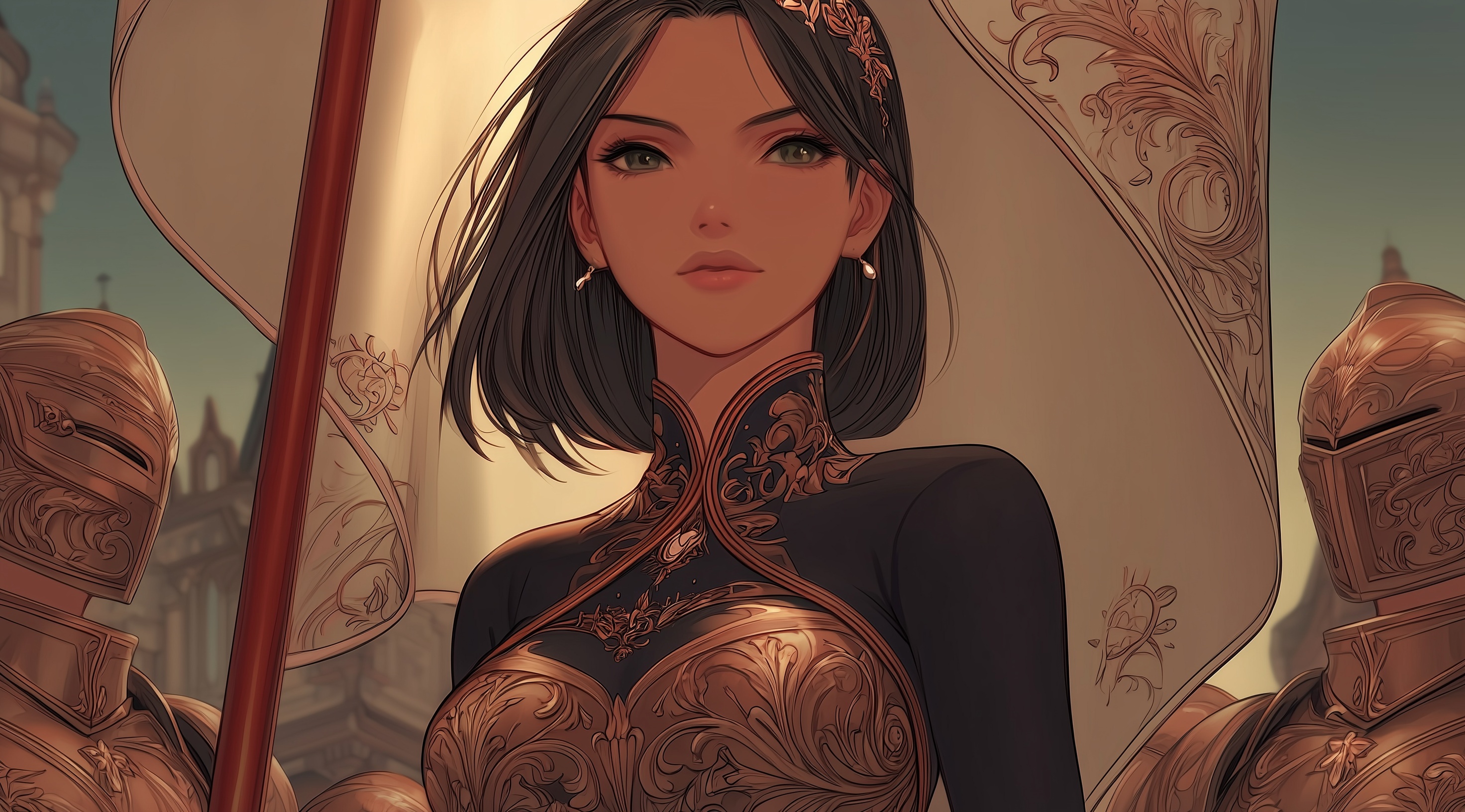
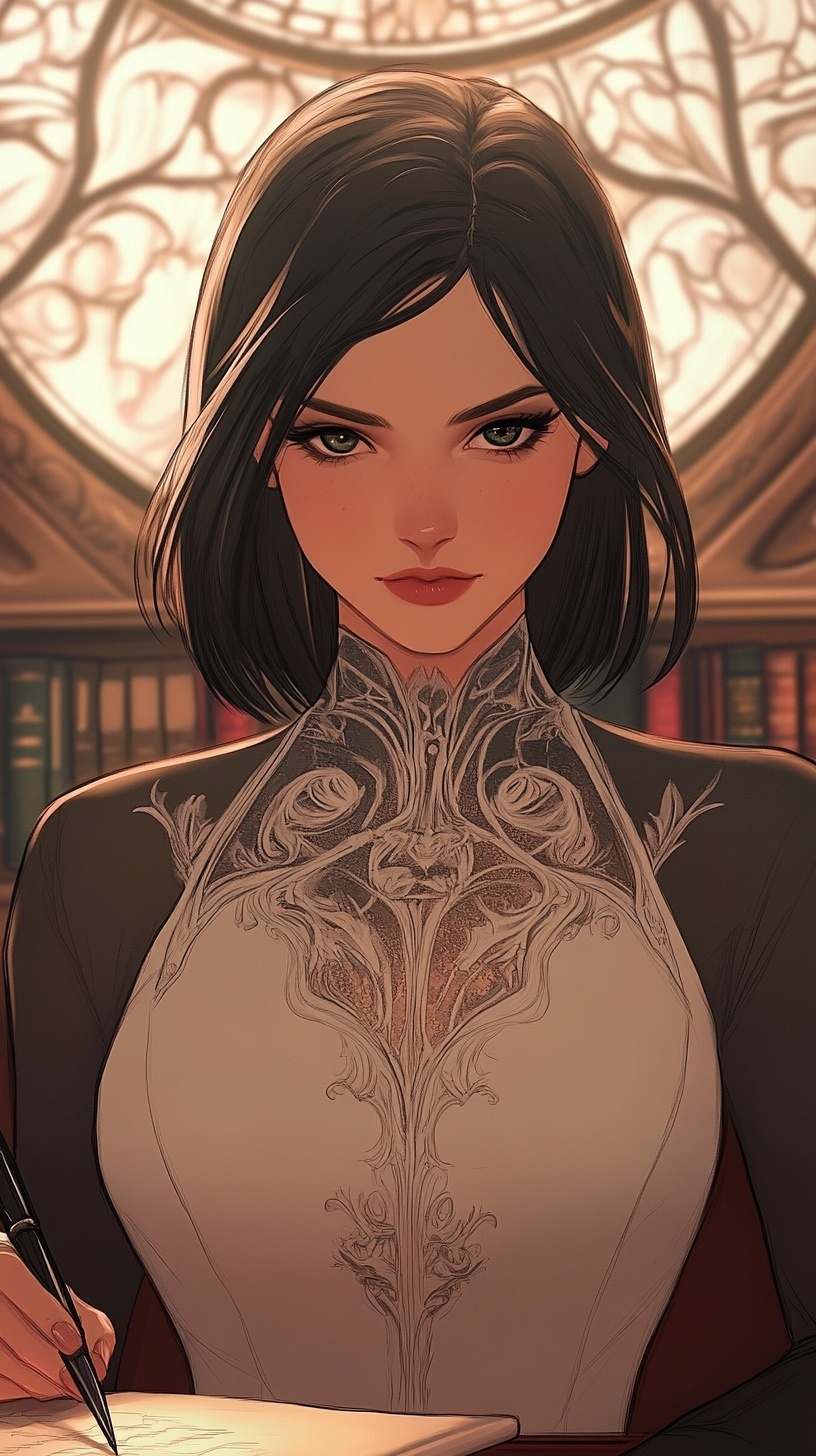
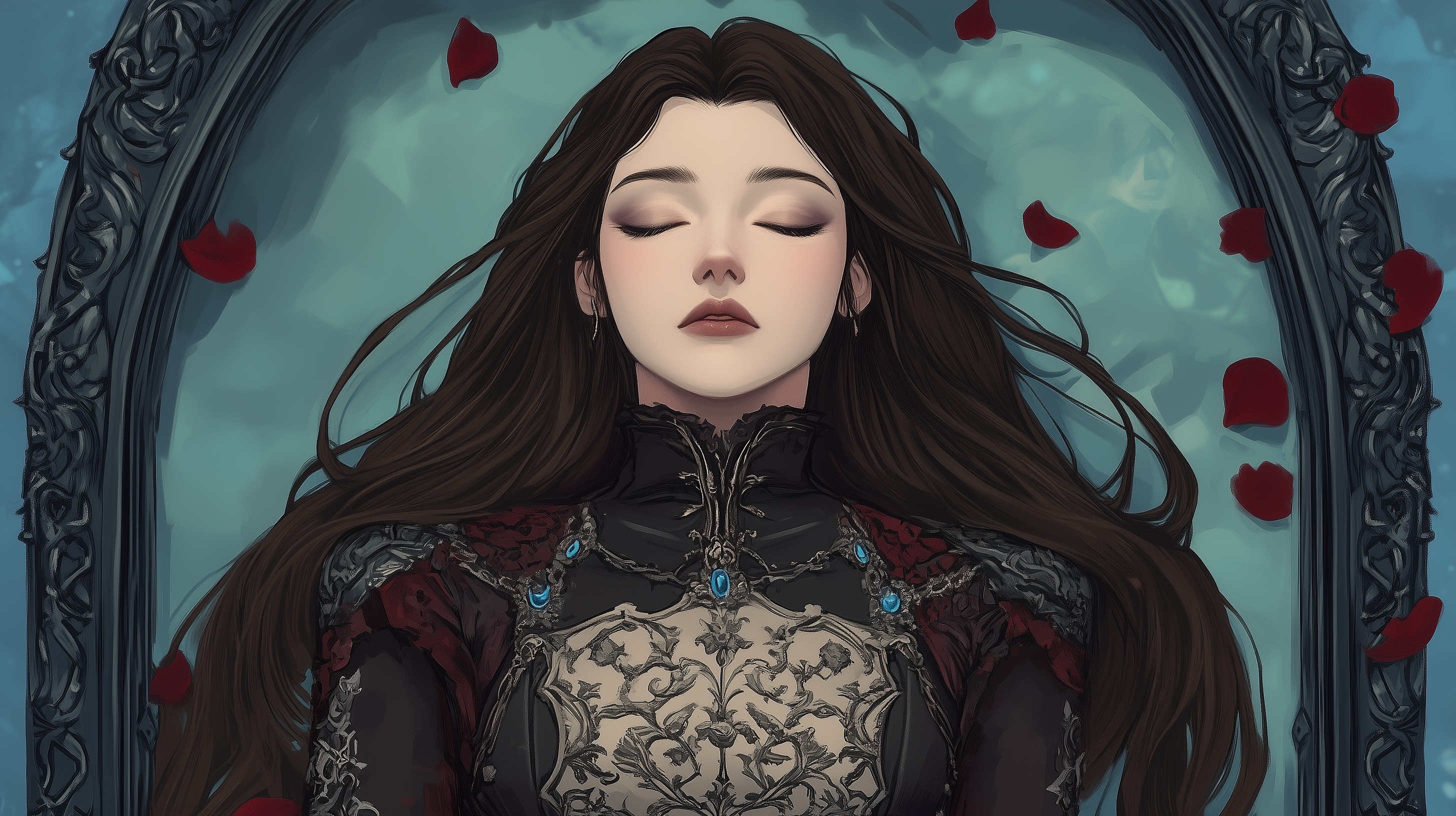
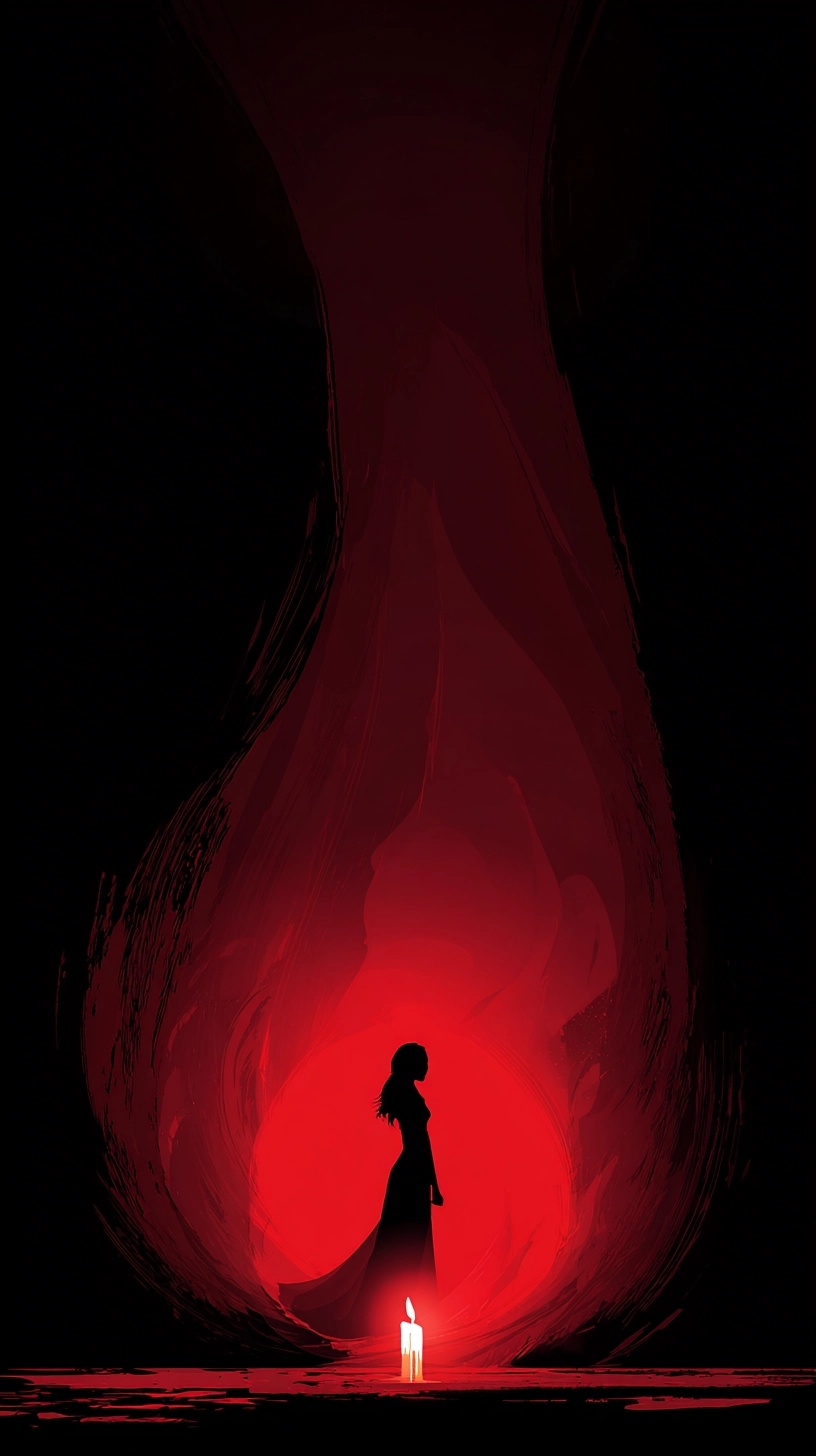



Comments